


The University of Pretoria congratulates all our academic achievers.








The University of Pretoria congratulates all our academic achievers.




A-rated researchers
Prof Michael Bruford 64
Prof Charles van Onselen 64
Prof Johannes van Oort 64
B-rated researchers
Prof Marthán Bester 65
Prof Lyn-Marie Birkholtz 65
Prof Wilhelm de Beer 65
Prof Marcel de Jeu 66
Prof Charl de Villiers 66
Prof Ina Fourie 66
Prof Kobus Kok 67
Prof Peter le Roux 67
Prof Johan Malherbe 67
Prof Willie Nicol 68
Prof Sue Nicolson 68
Prof Llewellyn Padayachy 68
Prof Nelishia Pillay 69
Prof Tahir Pillay 69
Prof Christian Pirk 69
Prof Emil Roduner 70
Prof Egmont Rohwer 70
Prof Pavel Selyshchev 70
Prof Ann Skelton 71
Prof Bernard Slippers 71
Prof Emma Steenkamp 71
Prof Alta van der Merwe 72
Prof Ernest van Eck 72
Prof Braam van Wyk 72
Prof Ventaka Yadavalli 73
C-rated researchers
Prof Mujahid Abbas 74
Dr Alexander Antonites 74
Prof Karin Barac 74
Prof Nigel Barker 75
Prof Irene Barnes 75
Prof Conrad Beyers 75
Prof Billy Boshoff 76
Prof Theo Bothma 76
Prof Norman Casey 76
Prof Alice Chan 77
Prof Christian Chimimba 77
Dr Kerry Chipp 77
Dr Nicoleen Coetzee 78
Prof Stephan de Beer 78
Prof Nico de Bruyn 78
Prof Henrietta de Kock 79
Prof Pieter de Villiers 79
Dr Alta de Waal 79
Prof Mmantsae Moche Diale 80
Prof Alet Erasmus 80
Prof Eric Etter 80
Dr Sunet Eybers 81
Prof Ute Feucht 81
Dr Salomé Geertsema 81
Prof Aurona Gerber 82
Prof Stephan Geyer 82
Prof Abubeker Hassen 82
Dr Natalie Haussmann 83
Prof Marlene Holmner 83
Prof Brett Hurley 83
Dr Ensa Johnson 84
Dr Rodwell Kufakunesu 84
Prof Marilé Landman 84
Prof Henrietta Langmi 85
Dr Mia le Roux 85
Dr Patricia Lutu 85
Prof Vinesh Maharaj 86
Prof
Prof
Prof
Prof
Prof Sanushka Naidoo
Prof Siona O’Connell
Dr Jonathan Okeke
Prof Daniel Petzer
Prof Marietjie Potgieter
Prof Anastassios Pouris
Prof Reineth Prinsloo
Prof Gert Prinsloo
Prof Abel Ramoelo
Dr Jean-Baptiste Ramond
Y-rated researchers
Dr
Dr Joanne Karzis
Dr Derik le Roux 101
Dr Eugene Makgopa 101 (awarded posthumously)
Dr Kgadi Mathabathe 101
Dr Mbuso Mlambo 102
Dr Nedine Moonsamy 102
Dr Suzanne Smith 102
Dr Thabsile Thabethe 103
Dr Philemon Tsele 103
Dr Liezl-Marié van der Westhuizen 103
Dr Jacomien van Niekerk 104
Dr Neriman Yilmaz 104
NRF rating categories
Acknowledgements
Portraits in this publication are by EyeScape Studios. Other photo credits: Greatstock/Shutterstock.com. The UP Language Unit is acknowledged for sub-editing. Publication Manager: Tebogo Menong, Department of Institutional Advancement. Design and layout: Liana Schröder, Department of Institutional Advancement. Proofreading: Shakira Hoosain, Department of Institutional Advancement.


The year 2021 has been a testing year for UP and the world as we continue to fight the war against the COVID-19 pandemic. When the COVID-19 pandemic began in South Africa last year, the three- to six-week lockdowns had us all believing that this enemy would be soon vanquished. Unfortunately, the world has come to learn that it seems this virus will be among us for a long time to come. Research institutions, including universities, have been at the forefront of trying to find scientific solutions to this scourge. This all needs to be encouraged and celebrated. However, we must not forget that the other challenges faced by society did not magically disappear because COVID-19 is among us. Universities are at the forefront of the fight against inequality, poverty, discrimination and hunger, which have been accelerated by the COVID-19 pandemic. Our academics and researchers have been ensuring that we achieve our aim of becoming a leading research-intensive university in Africa, recognised internationally for offering a high-quality education, creating knowledge and producing research that will have an impact and make a difference in addressing local and global challenges.
Because we are a future-focused and future-orientated university, the Academic Achievers event plays a big part in us acknowledging the efforts of our academics, who are increasingly having to ensure that their research helps to solve “real-life problems” and have transformative impacts in society. For example, UP will soon be launching the Centre for the Future of Work to assist our country, continent and world to be future fit. The agenda of the centre critically includes entrepreneurship in higher education, which is now widely recognised as being as important as postgraduate studies, and a major driver of innovation and job creation. Other examples of solving real-lie problems include UP researchers using the history and favourable genetics of Drakensberger and Bonsmara cattle breeds to increase productivity and food security. Still on food security, scientists at the Engineering 4.0 research hub have tracked the journey of 3-D-printed avocados on a ship from South Africa to the Netherlands. These avocados had microsensors implanted as part of a research project to determine any damage to fresh produce during transportation. UP researchers are also making headway in understanding the accuracy and reliability of sound-level monitoring earphones and the effect of smartphone feedback as an intervention to encourage safe listening use among young people. This research could change the lives of millions of people by reducing the risk of hearing loss. Furthermore, UP researchers discovered new potent chemical compounds that show potential as candidates for both the treatment and elimination of malaria.
These research contributions have led to UP being ranked number two in South Africa and Africa in uniRank’s list of the top universities on the continent. The University also featured in the Shanghai Ranking consultancy’s 2021 Global Ranking of Academic Subjects (GRAS), which assesses over 4 000 universities globally in 54 subject areas. UP was ranked in the top 500 universities globally and is the top in South Africa in computer science and engineering, veterinary science, and finance. The University ranked in the top 70 in the world for sport science schools and departments. UP also ranked second in SA in the following subjects by the Times Higher Education (THE Rankings): accounting and finance, and biological sciences; joint first in SA (Impact Rankings): SDG9 (industry innovation and infrastructure); and joint first in SA: SDG17 (partnerships for the goals).
I would like to convey my utmost appreciation to all of you for sustaining the stature of the University of Pretoria as a leading African university that is locally, continentally and globally engaged and connected. An institution that is passionate about contributing meaningfully to South Africa, Africa and the world. Your achievements have an immeasurable part to play in this new reality as we rethink the traditional boundaries between disciplines and pursue transdisciplinary approaches, which can lead to more innovative work and a far more creative sustained impact – and will propel us to do and achieve even more. In that way we are drivers of and agents of societal change for better futures.





Professor Tawana Kupe
Vice-Chancellor and Principal University of Pretoria

Professor Quarraisha Abdool Karim, PhD, DSc (hc) (University of Johannesburg), DSc (hc) (Stellenbosch University), who received an A rating from the NRF, is a South African epidemiologist who has made pioneering contributions over the past 32 years. Her work includes efforts to prevent HIV in adolescent girls and young women and the landmark CAPRISA 004 trial, which demonstrated for the first time that antiretrovirals could prevent HIV infection. Through the Columbia University-Southern African Fogarty AIDS International Training and Research Programme (CU-SA Fogarty AITRP), she played a central role in training more than 600 scientists to establish a strong science base to enhance responses to HIV/AIDS and tuberculosis through discovery and the implementation of scientific research. She is a strong advocate for the rights of people living with and affected by HIV and encourages women to pursue careers in science and technology.
She is a co-founder and Associate Scientific Director of CAPRISA, Professor in Clinical Epidemiology (Columbia University), Pro-Vice-Chancellor for African Health (University of KwaZulu-Natal), Co-Chair of the UN SDG 10-Member Technical Facilitation Mechanism and the UNAIDS Special Ambassador for Adolescents and HIV.
She is also a Fellow of the African Academy of Science, the World Academy of Science, the Royal Society of South Africa, and the Academy of Science of South Africa, and a member of the National Academy of Medicine (USA).



Associate


The Chancellor’s Award is made in recognition of exceptional achievement in the field of research aimed at the advancement of science, and the associated promotion of the interests of the University of Pretoria.




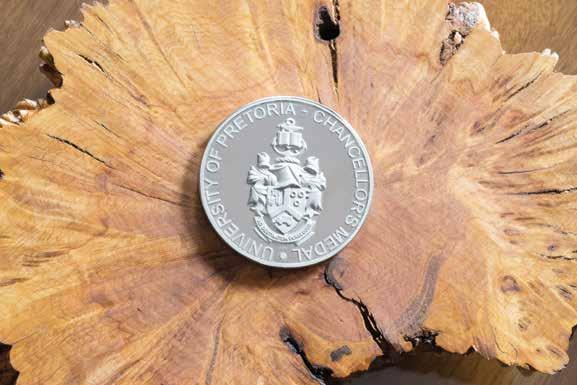


Professor Brenda Wingfield is internationally recognised as a leader in fungal genetics. She collaborates with researchers from different parts of the world, as is evident from the many co-authors on her publications. She was Vice President of the Academy of Science of South Africa until 2020 and is the Secretary-General of the International Society of Plant Pathology, her second term in this prestigious position.
Prof Wingfield has exemplified research excellence during her three decades as a research scientist. She has supervised more than 100 MSc and PhD students, many of whom are now internationally recognised in their own right. While the majority of them are South African, others come from South America, Asia and Africa. She has published more than 400 articles in peer-reviewed journals. She has mentored many young academics and is a powerful advocate for gender equality. She has promoted public understanding of science and has served her community through participating in committees and panels. She is associate editor of several scientific journals and is a senior editor for IMA Fungus, the journal of the International Mycology Association. She has received significant recognition for her research in the form of important awards from a number of scientific societies both in South Africa and internationally.
Prof Wingfield has pioneered Fungal Genomics in South Africa. She led the sequencing of the first fungal genome in Africa. This was the first eukaryotic genome where the DNA was isolated, and the genome data was generated on this continent (that is not outsourced). In proving that African researchers can be leaders in the field of genomics and bioinformatics, she inspired other researchers. Prof Wingfield was awarded one of the coveted government-sponsored research chairs, the Chair in Fungal Genomics.
Prof Wingfield’s research focuses on fungal pathogens of plantation-grown trees. This has supported the South African forestry industry to manage and protect their biological assets from fungal disease. Her research, using phylogenetics, has enabled her and her collaborators to develop important DNA diagnostics for these pathogens. She developed a strong population genetics platform to study pathogen populations, first using RAPDs and AFLPS but later developing microsatellite markers. Subsequently, tools to sequence, assemble and annotate the genomes of these tree pathogens followed. Prof Wingfield and her colleagues now have a transformation platform to undertake functional gene studies on these fungi. While this might be commonplace for model fungi, few equivalent platforms exist for non-model fungi.





The University of Pretoria introduced the Vice-Chancellor’s Book Award to recognise and reward authors of scholarly books, monographs and collections. The prizes are awarded once a year in two categories, namely humanities and social sciences (broadly defined) or natural and applied sciences.
A book is considered to be scholarly if it presents the findings of an original, systematic investigation undertaken to gain new knowledge and insight, advances knowledge in a particular discipline and brings credit to the University. Scholarly books may be written in any of South Africa’s official languages and translations of major works originally published in other languages are also considered. In order to qualify for nomination, books should bring credit to the University on account of their contribution to the advancement of the humanities, the social sciences or the natural and applied sciences.






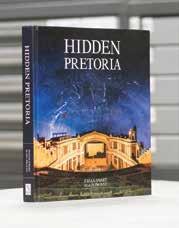
Johan Swart holds a master’s degree in architecture and heritage studies. He teaches architectural history and runs a heritage focused design studio for postgraduate students at the University of Pretoria. As curator of the architecture archives at the University, he is also responsible for the safeguarding and interpretation of significant historical drawing collections. His academic interests include the history of design, archival practice, cultural landscapes and adaptive reuse.
Together with the photographer, Alain Proust, Swart recently completed the publication Hidden Pretoria. It can be measured within the disciplines of architectural history, heritage studies and photographic documentation. The project is a systematic documentation, analysis and interpretation of architectural heritage sites within the City of Tshwane, based on extensive fieldwork and primary research.
Furthermore, the publication is a highly curated visual product, which is intended as a detailed photographic record for posterity and a reflection of architectural spaces.
Pretoria is severely underrepresented in the realm of architectural and heritage books. As a heritage survey, historical overview and a photographic documentation of the city, Hidden Pretoria fills an important gap in the scholarly interpretation of the city. This publication is the first that provides an overarching survey of the city’s architectural heritage sites combining detailed contemporary photographic documentation with expert descriptions based on archival evidence and oral histories.
Completed over three years, 30 sites out of an initial survey of more than 200 were selected for inclusion in the book. The author completed a preliminary visit to each site, after which the photographic documentation was planned and executed. With direct access to the relevant archives and contact with various experts and stakeholders, in-depth research was conducted for each site which was eventually distilled into summative interpretations that were organised chronologically, thematically and visually to form a cohesive historical and architectural narrative.
In addition to the introduction that provides a critical overview of urban histories, site typologies and heritage definitions, the chapter texts consistently contain descriptions in the following sequence: historical introduction; typological interpretation; architectural description; current condition; social context and heritage reflection. The book also provides references and a bibliography on the city that could be useful to students and researchers in future. This publication represents the culmination of a longstanding interest of the Department of Architecture in the heritage sites of Pretoria and is a synthesis of various scholarly opinions, archival records and tacit knowledge collected by a group of academics but documented here by the author. By combining academically credible approaches to architectural heritage documentation with a contemporary photographic survey, Hidden Pretoria is a unique scholarly contribution that is likely to become a valuable reference source in future.








Professor Charles van Onselen is a Research Professor at the Centre for the Advancement of Scholarship at the University of Pretoria (UP) and is affiliated to the Department of Historical and Heritage Studies. His book, The Night Trains: Moving Mozambican Miners to and from South Africa, circa 1902-1955 (Johannesburg and Cape Town: Jonathan Ball Publishers, 2019), has been applauded by a range of high-profile academics, including Professor James Campbell of Stanford University who states that this is “the work of a master historian”.
Professor Alois Mlambo of the Department of Historical and Heritage Studies at UP observes that: “Van Onselen has produced a masterpiece and a seminal contribution to scholarship which should be a must-read for anyone who wishes to have a deeper understanding of the forces that helped shape the historical experience and present reality of Southern Africa since the late nineteenth century”; while Professor James Scott of Yale University writes that: “The great master of social history Van Onselen provides us an unsurpassable lesson in the commodification and disposal of human life”. This book is indeed regarded by many as one of Van Onselen’s finest.
Night Trains has been described as a “tour de force that deals with a very important aspect of Southern African political, economic and social history”. It focuses on a train journey from Mozambique to South Africa to demonstrate how local and international mining interests horribly exploited workers from Sul do Save and trampled on their dignity and human rights.
As the back cover indicates, “The story of the night trains echoes today through songs such as Stimela and Shosholoza. But the experience of the poverty-stricken Mozambicans who travelled on the trains has never been told. Night Trains lays bare the hellish world”.
Prof Van Onselen is the recipient of numerous other awards. He has been awarded the UP Chancellor’s Award for research; the UP Vice-Chancellor’s Book Award; and the Human Sciences Research Council gold medal for a distinguished contribution to the Social Sciences and Humanities.
He has received numerous book awards, including those for Masked Raiders and The Fox and The Flies. His book, The Seed is Mine: The Life of Kas Maine - A South African Sharecropper, 1894-1895, won the Sunday Times Alan Paton award for non-fiction and was also voted one of the hundred best books to come out of Africa in the twentieth century.
Prof Van Onselen received an A1 rating from the NRF.




This award is made annually to senior academics who have already achieved the status of professor, are regarded highly by their peers, and have consistently excelled in the areas of under- and postgraduate teaching and learning, research, community service and administration over a period of time. Any academic who has been awarded an A-rating by the NRF in the year under consideration automatically qualifies as an Exceptional Achiever for as long as he or she remains an A-rated researcher.






Professor Hein Venter is the Head of Department for Computer Science, in the Faculty of Engineering, Built Environment and Information Technology, where he teaches computer security and digital forensics at undergraduate and postgraduate levels. He holds BSc, BSc Honors, MSc and PhD degrees in computer science from the University of Johannesburg.
He is the coordinator for postgraduate degrees in the Department. He also supervises and co-supervises more than 30 postgraduate students on honours, master’s, and doctoral levels. He is the research group leader for the Digital Forensic Science Research Group, responsible for supervising postgraduate students. He has supervised 74 BSc honours mini dissertations, 42 MSc dissertations, and 12 PhD theses. Prof Venter produced more than 260 peer-reviewed journal and conference publications during his research career and holds a Google Scholar h-index of 28 with 3115 references to his research (2219 since 2016). He is a reviewer for several international conferences and journals and holds several research grants. Prof Venter has been a member of the Institution of Electrical Engineers and the Association of Computing Machinery since 2007, and a member of the American Academy for Forensic Sciences since 2009. He is also the general chair for the Information Security South Africa academic conference.
Prof Venter has engaged in extensive international collaboration, the most noteworthy being his contribution to the standardisation of the digital forensic investigation process on the International Organisation for Standardisation (ISO) level. He initiated the process in 2010 and was appointed as the main editor of the standard. The standard is entitled ‘ISO/IEC 27043: Information Technology – Security Techniques – Incident Investigation Principles and Processes’ and was published in March 2015 by ISO. He was also editor of ‘ISO/IEC 27035: Information Technology – Incident management – Part 3: Incident response operations’ published in 2020 by ISO. He is co-editor of a new international standard on Security Operations Centers.
Prof Venter recently served on a panel that was tasked by the Department of Science and Technology to develop a national cybersecurity research agenda that includes cybersecurity awareness, cybersecurity human capital development, identity, privacy and trust management, cybersecurity legislation, threat detection, mitigation and response, digital forensics, eGovernment security, and critical infrastructure protection.
Prof Venter received a B3 rating from the NRF.


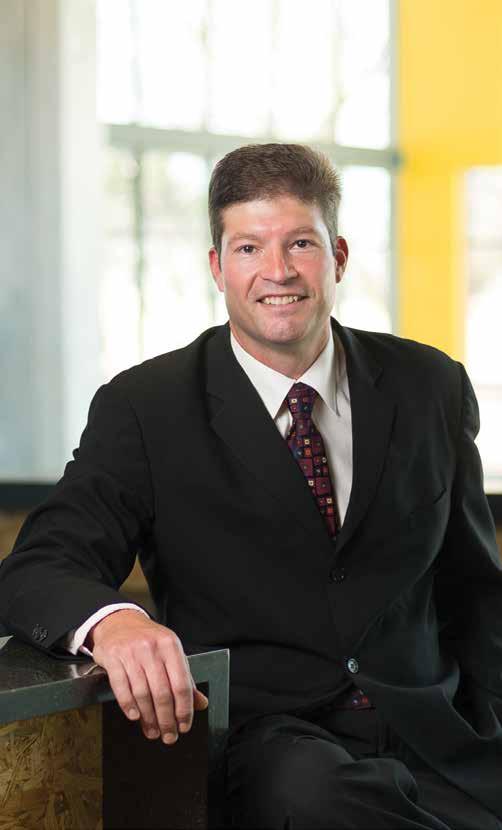

Professor Ncholu Manyala is a professor in the Department of Physics and chairperson of the South Africa Research Chair Initiative (SARChI) in Carbon Technology and Materials, part of the Institute of Applied Materials. The chair is multi-disciplinary and serves the Faculties of Natural and Agricultural Sciences and Engineering, Built Environment and Information Technology. He holds the following degrees: BSc in Physics and Mathematics from the National University of Lesotho, BSc Hons and MSc in Physics from the University of the Witwatersrand and a PhD in Physics from the Louisiana State University.
Prof Manyala also teaches second-year physics of materials science in the Department of Physics and the nano-carbon course at honours level in the Department of Chemical Engineering. His research focuses on carbon-based materials for energy storage applications as supercapacitors and batteries. He attempts to develop novel materials that will serve as electrodes for supercapacitors to increase their energy density without compromising their high power density. On average, Prof Manyala’s group publishes 15 papers a year on this research and also focuses on the development of novel materials for both cathode and anode electrodes for batteries.
Prof Manyala has supervised six master’s and 14 doctoral students since 2009 when he joined the University of Pretoria. He has participated in local and international conferences and is involved in the peer review of numerous international Journals such as ACS Sustainable Chemistry and Engineering, Electrochica Acta, Chemical Engineering Journal just to mention a few. As the SARChI Chair, Prof Manyala has received considerable funding to develop his research from the National Research Foundation (NRF). It enabled collaboration between South Africa and institutions such as the University of Bologna in Italy, the Chalmers University of Technology in Sweden, the University of Annaba in Algeria, and the University of Pennsylvania and Drexel University, in the USA.
He holds a Google Scholar h-index of 34 and more than 2700 citations from Scopus and has been selected as one of the finalists in the National Science and Technology Forum-South32 Awards in the Engineering Research Development category. He is a founding member of the African Laser Centre and member of the International Society of Electrochemistry, the South African Institute of Physics and the Microscopy Society of South Africa.
Prof Manyala received a C2 rating from the NRF.




Professor Jaco Greeff is a full professor in the Genetics section of the Department of Biochemistry, Genetics and Microbiology in the Faculty of Natural and Agricultural Sciences.
He is a behavioural and evolutionary ecologist interested in determining the importance of natural selection in shaping organisms’ behaviour. He studies sex ratios - one of the most famous examples of adaptation. He uses models to predict optimal behaviour, genetics to identify mothers of offspring and compare the models’ abilities to explain the numbers of sons and daughters mother fig wasps produce. By changing the situations under which mothers lay their eggs, he showed that natural selection is less important and that it is more likely that simple behavioural patterns with some limited adaptive value have additional but coincidental fitness benefits. A sobering take home message of the work is that even traits that were thought to be perfectly ‘designed’ by Mother Nature appear to result from chance events.
He combined his behavioural ecological interests with genetics and genealogies to understand more about the Afrikaners’ ancestry, their reproductive behaviour and even the nature of mutations of microsatellites. Research proved that the rate of cuckoldry during the past 300 years is less than 1%, that half the ‘Bothas’ should actually be called ‘Appel’, that Afrikaners are not more inbred than Europeans, and that 98.7% of Afrikaners have non-European ancestors. This ancestry stems primarily from slaves and the local Khoekhoe and San. The latter finding was unexpected.
Prof Greeff received a B2 rating from the NRF.





Professor Mike Sathekge, Bachelor of Medicine and Bachelor of Surgery (MB, ChB), MMed (Nuclear Medicine), PhD (Ghent) is a professor and Head of the Department of Nuclear Medicine at the University of Pretoria and the Steve Biko Academic Hospital. He is a Fellow of the Academy of Medicine, Singapore, and the executive of the University’s School of Medicine (SOM). He also serves on the selection, appointment and doctoral committees of the SOM and is a member of the UP Senate.
As a tribute to his international scientific standing, he has been appointed Editor-in-Chief of the Seminars in Nuclear Medicine (IF = 4.446), the number one review and teaching journal of nuclear medicine. Prof Sathekge is also an associate editor of the top two research journals in nuclear medicine, namely the European Journal of Nuclear Medicine and Molecular Medicine (IF = 9.236) and the Journal of Nuclear Medicine (IF= 10.057). Prof Sathekge is the president-elect of the World Association of Radiopharmaceuticals and Molecular Therapy (WARMTH). He has served in various capacities in many relevant medical societies and associations such as the Medical Research Council, Colleges of Medicine of South Africa and the International Society of Radiolabeled Blood Elements, as well as past Secretary-General of the World Federation of Nuclear Medicine and Biology (WFNMB).
Prof Sathekge has led and convened the positron emission tomography (PET)/computed tomography (CT) guidelines and targeted radionuclide guidelines in South Africa. He serves as an International Atomic Energy Agency expert and has co-authored the international training curriculum for nuclear medicine physicians. He is also a member of the Lancet Oncology Commission on radiotherapy and theranostics.
Prof Sathekge has published over 200 articles and is one of the global leaders in treating prostate cancer using prostate-specific membrane antigen (225Ac-PSMA and 213Bi-PSMA). He also led and introduced several targeted molecular imaging and therapeutic probes in infection and oncology. He is a recipient of several key awards for research and service, some of which include the award to host the Main Nuclear Medicine Research Infrastructure Facility (NuMeRI) in South Africa, the South African Clinician Society Research Excellence Award, and the Medical Research Council’s prestigious President’s Award for exceptional lifelong contribution to medical research and public health. Prof Sathekge is the chair of the Academy of Science of South Africa (ASSAf) panel on research, development, and innovation (RDI) of peaceful uses of nuclear technologies in South Africa.
Prof Sathekge received a B rating from the NRF.






This award is given to exceptional young achievers in the field of research, as seen against the University’s strategic goals of achieving academic excellence, international competitiveness and local relevance.
Any person who has been evaluated by the NRF as a P-rated researcher automatically enjoys Exceptional Young Researcher status.






Dr Mehdi Mehrabi is a senior lecturer in the Department of Mechanical and Aeronautical Engineering and a member of the Clean Energy Research Group, in the Faculty of Engineering, Built Environment and Information Technology.
His research interests include heat transfer and fluid mechanics, computational fluid dynamics, microfluidics and their applications in biomedical engineering, and modelling and optimisation based on artificial intelligence techniques. He also researches clean and renewable energy, energy efficiency based on multi-objective optimisation techniques, and the application of machine learning methods in mechanical and biomedical engineering.
Peer-reviewed papers on his research projects have been published in more than 20 international mechanical engineering journals, and he has presented his research results at major international conferences around the world. The number of citations accredited to him and his h-index attest to the high quality of his research outputs. In addition, he has successfully supervised more than 50 undergraduate and postgraduate students at the University of Pretoria and regularly serves as a member of the examination committee for master’s and PhD candidates.
Dr Mehrabi received a Y1 rating from the NRF in 2020.






Dr Shepherd Tichapondwa is a senior lecturer in the Department of Chemical Engineering, Faculty of Engineering, Built Environment and Information Technology, where he teaches chemical engineering materials, environmental engineering (specialisation), and chemical water treatment at undergraduate and postgraduate levels. He holds a BEng (Hons) in Chemical Engineering from the National University of Science and Technology (Zimbabwe), and a BEng (Hons) specialising in polymer processing, a master’s in Chemical Engineering, and a PhD in Engineering from the University of Pretoria.
His research focuses on the synthesis and formulation of materials for various applications. In particular, the research covers fields such as pyrotechnics and primary explosives, which seek to develop ‘green’ time delay compositions and lead-free primary explosives for use in mine detonators. Additionally, he is involved in the development of advanced drinking and wastewater treatment technologies. His main project involves developing visible light-activated photocatalysts that can be applied to degrade refractory and emerging organic pollutants. His other focus areas include synthesis and tailoring cost-effective adsorbent materials, microbial fuel cells, phytoremediation, and phytomining. This work is conducted in the Water Utilisation Engineering Division and Institute of Applied Materials in the department. His research activities have culminated in more than 30 scientific peer-reviewed journal articles, and he has presented at 10 national and international conferences. Examples include the 43rd International Pyrotechnics Society Seminar hosted in Fort Collins, Colorado, USA and the 22nd International Conference on Process Integration, Modelling, Optimisation for Energy Saving and Pollution Reduction (PRES19) hosted in Crete, Greece. He attributes his research outputs to the close working relationship with his collaborators, funders, and postgraduate students.






Dr Tuan Duong is a senior lecturer in the Department of Biochemistry, Genetics and Microbiology, Faculty of Natural and Agricultural Sciences. He is also a team member of the Forestry and Agricultural Biotechnology Institute at the University of Pretoria. He holds a BSc (Biotechnology), and an MSc (Biology) from the Vietnam National University, and a PhD (Genetics) from UP.
Dr Duong’s research primarily focuses on using genome and transcriptome data to understand the genetic basis of pathogenicity and host adaptation of fungal pathogens of plants. He is actively exploring next-generation sequencing technologies and applying them in his research. He has published over 60 scientific articles in peer-reviewed journals, which together have accumulated over 5000 citations.
He frequently participates in national and international meetings and is also part of several international collaborative research networks.
Dr Duong received a Y1 rating from the NRF.





Dr Jonathan Okeke is a senior lecturer at the University of Pretoria, and a senior research fellow at the Centre for Interdisciplinary and Intercultural Philosophy, Eberhard Karls University of Tübingen, Germany.
His teaching and research interests include African philosophy, logic, ethics, political philosophy, and decoloniality. He propounded the theory of conversational thinking and a system of logic called Ezumezu that have been the themes of some international colloquia and round tables. He has won research awards and delivered several invited talks around the world.
He is the African philosophy area editor of the Internet Encyclopaedia of Philosophy. Dr Okeke has mentored, and continues to mentor many young African scholars and has published many articles, chapters, and books. He is a co-author of the forthcoming book African Metaphysics, Epistemology and a New Logic: A Decolonial Approach to Philosophy (Palgrave 2021) and is working on a new manuscript titled The Structure of Conversational Thinking. He is also the principal investigator in the funded research projects Decoloniality through Conversational Thinking and Decolonial Methods in the Humanities.
Dr Okeke received a C1 rating from the NRF.






Dr Faheema Mahomed-Asmail is a senior lecturer in the Department of Speech-Language Pathology and Audiology, University of Pretoria. She obtained her undergraduate and postgraduate degrees at the University, completing her master’s degree and PhD over a total of four years. Currently, she supervises undergraduate and postgraduate research, provides undergraduate clinical training and teaches audiological intervention. She is involved in interprofessional education and collaborative practice within the School of Health Sciences at the University of Pretoria and also serves on the Faculty of Humanities Teaching and Learning Committee.
Her research interest lies in providing access to person-centred ear and hearing health care through innovative mobile health (mHealth) technologies and service delivery models. Dr Mahomed-Asmail is part of a growing team of young researchers headed by Professor De Wet Swanepoel (University of Pretoria), who are developing, evaluating, and applying these solutions which have gained increased interest and traction globally with the current COVID-19 pandemic and the need for physical distancing.
Dr Mahomed-Asmail has published more than 20 articles in international and nationally accredited, high-impact, peer-reviewed journals. She has written several chapters for various online books, an open-access guide and delivered presentations at several local and international conferences. More than 85% of her postgraduate students obtained distinctions. She collaborates with colleagues at University of Western Australia, Örebro University (Sweden), IDA Institute (Denmark) and the global Person-Centered Hearing Network. She has received research funding through the University of Pretoria’s Research Development Fund (2016-2018), and the academic development grant from the Capacity Development Programme (2022), the Andrew Mellon Inclusive Professoriate grant (2019-2021), and funding from the NRF (2022).
Her work has been recognised on a number of different levels. During her postgraduate studies, she won the prize for the best master’s degree student in the Faculty of Humanities. Subsequently, she won the Audiology Doctorate research prize at the Ear Nose and Throat/South African Academy of Audiology. She also received the Faculty of Humanities Emerging Researcher Award from the University of Pretoria. Dr Mahomed-Asmail is currently participating in the prestigious Department of Higher Education and Training Future Professors Programme (Cohort 2). She currently holds an h-index of 10.
Dr Mahomed-Asmail serves as chairperson of the Research and Education Committee of the South African Speech-Language-Hearing Association (SASLHA) and is a committee member for the association’s annual conference. She is a volunteering member of the IDA-SA steering group working to advance the goal of building a local community that embraces person-centred hearing care.
Dr Mahomed-Asmail received a Y1 rating from the NRF in 2020.




Dr Michael Barrett-Berg is a senior lecturer in the Department of Music, School of the Arts, where he teaches choral conducting at postgraduate level. He also conducts the Tuks Camerata, an internationally acclaimed choir. He holds the following degrees from the University of Pretoria: BMus, MMus, and DMus performing arts, and obtained a Postgraduate Certificate in Education (PGCE) and Performance Licentiate (singing) through UNISA.
Dr Barrett-Berg focuses on the significance of choral singing for singers and conductors, with specific attention to South Africa’s multicultural environment. Research is done through qualitative inquiry, focusing on the motivations for participating (social, personal, musical) and finding strategies that lead to improved recruitment and retention. He also focuses on the advantages and disadvantages of choral competitions experienced by the conductor and the singers. He has published several articles and book chapters in accredited journals (British Journal of Music Education, Journal of Research in Africa, Muzikli) and through reputable publishing houses (GIA Publications, Roman & Littlefield). Dr Barrett-Berg is a composer and arranger and has published more than 25 international compositions through Santa Barbara Music Publishing and Walton Music.
Under his musical direction, the Tuks Camerata has won many national and international awards in recent years, having received three South African Music Award nominations, produced four albums, all to critical acclaim, and performed at some of the most prestigious international choral symposia, such as the World Symposium of Choral Music.
Dr Barrett-Berg is an internationally acclaimed choral clinician, lecturer, and workshop presenter, and as such, is regularly invited to serve on jury panels for choral competitions and festivals. He currently serves on the World Choir Council (Germany) advisory board, is a founding member of the International Choral Conductors Federation (Italy), and is an active member of the American Choral Directors Association, the International Federation of Choral Music, and the African Youth Choir. As a guest lecturer, he serves in the faculties of the CHORALSPACE Academy (Portugal) and the International Choral Academy (China). In 2018, he served on the artistic committee of the World Choir Games, hosted by Interkultur (Germany).
Dr Barrett-Berg is the managing director and co-owner of Capital Singers, South Africa’s largest community choir and conductor of the Chamber Singers, a sought-after adult chamber choir based in Pretoria.




This award recognises the contribution of members of our academic staff who excel as supervisors of postgraduate research students. The award is made on the grounds of exceptional performance measured in terms of the students’ academic achievement. Evidence of excellent mentorship and guidance provided to young researchers and academic scholars is also taken into consideration.






Professor Namrita Lall serves in the Department of Plant and Soil Sciences at the University of Pretoria and holds a DST/NRF South African Research Chair from Indigenous Knowledge Systems as part of the South African Research Chairs Initiative (SARChI). As part of this initiative, Prof Lall’s key objectives include: improving South Africa’s international research standard while responding to local social and economic challenges and creating research career pathways for young and mid-career researchers, with a strong research, innovation and human capital development output trajectory.
Prof Lall is internationally recognised as a leading scholar in Phytomedicine, which is reflected by her appointment as an adjunct professor at the School of Natural Resources, University of Missouri, USA. This department is rated as one of the top fifteen in the world. She has been placed in the top one percent of the Essential Science Indicator’s list for publication citations in pharmacology and toxicology. To date, Prof Lall has co-authored over 168 research articles in peer-reviewed journals and 56 book chapters. She has edited three books on medicinal plants published by Elsevier and Taylor and Francis. Fifty master’s and PhD students have obtained their degrees under Prof Lall’s supervision/co-supervision to date. Several students received awards such as the GAP (Gauteng Accelerator Program) Biosciences Innovation Award, 2nd Prize (2016), the L’Oreal-UNESCO International Rising Talents Award for Women in Science (2018), the Fullbright Scholarship, best thesis award in Germany, the Margaretha Mes Medal, the DST-Albertina Sisulu PhD Fellowship, and the South African Women in Science Awards (2018). Prof Lall obtained her PhD in 2001 and currently leads a research group in the Medicinal Plant Sciences Programme. The main focus of her research is the use of medicinal plants for humans. The aim, therefore, is not only the isolation and purification of pharmacologically relevant phytochemicals as new lead compounds but also the investigation of complex extracts and semi-pure fractions to use in the medicinal plant industry related to primary health care for humans. The programme investigates medicinal plants for tuberculosis, cancer, and skin-related diseases.
Prof Lall’s research team has discovered several medicinal plants with valuable biological activities, many of which have been patented nationally and internationally. The sixteen prototypes/ commercialised products that have been developed in Professor Lall’s laboratory have undergone extensive research and development, including in vitro validation and pre-clinical and clinical trials. These have been licensed to manufacturers and formulators. Prof Lall works closely with partners in the industry as well as with traditional health practitioners. Priorities include bioprospecting, ethics, intellectual property rights and benefit-sharing related to this process. Three start-up companies, namely, Bio Indigenous Solution, a community-based company in Mamelodi, Pretoria, Tone Tribe and Blyde Botanics (established by young postgraduates), resulted from Prof Lall’s research programme.
She received several awards in recognition of her work, including the UNESCO-L’Oreal Award for Women in Science (one of ten international candidates), Paris, March 2002, and the Order of Mapungubwe, South Africa’s highest honour in April 2014. In addition, she has been the runner up in the national Gauteng Accelerator Programme (GAP) innovation competition, which identifies emerging technology entrepreneurs (November 2016), the winner of the Biotech Fundi Lifetime Contribution Award, the Gauteng Department of Agriculture and Rural Development (GDARD), and the winner of Innovation Hub (March 2017). She has also received the Top Intellectual Property Creator Award (2019).
Prof Lall received a C1 rating from the NRF.




The Laureates are awarded to nominated projects that display teaching practices with clear purpose and intent, and which have a strong alignment between the different elements in the broader context, to address identified needs or gaps with the aim of innovating to optimise teaching and learning.
These nominations show significant evidence of impact on student learning, are sustainable and can be replicated in other contexts. These projects contribute to best practice in teaching and display significant evidence of innovation that addresses the identified challenges.






Dr Christine Mundy is a lecturer in the Department of Chemistry, Faculty of Natural and Agricultural Sciences. She is enthusiastic and compassionate with several years of experience teaching general chemistry to first-year students enrolled in the BSc Extended Curriculum Programme on the Mamelodi Campus of the University of Pretoria. Over the years, her teaching style has been appreciated by her students, whom she takes on a journey to become informed citizens and ethical scientists.
Dr Mundy recently completed her doctoral studies in tertiary chemistry education research at the University of Pretoria. In her thesis, she applied cognitive load theory and cutting-edge, design-based research to identify and address learning barriers that first-year students face in understanding emission spectroscopy. Her work has shed light on the complex and counterintuitive role that everyday language plays in the teaching and learning of emission spectroscopy. She also refined the Mini Spec, a low-cost, hand-held spectrophotometer for students to build and use in the laboratory. The greatest success of the laboratory experiment is the unsolicited dissemination of the Mini Specs into the students’ communities that brought discussions on dazzling light spectroscopy into home environments of varied backgrounds. This informal outreach is valuable in reaching, including, and motivating communities in authentic displays of science.
Dr Mundy continues to improve the laboratory components of her courses. The COVID-19 pandemic mandated virtual laboratories at a first-year level. This allowed her to shift the focus from procedures and observations to guide students in higher-order thinking about the methodology, driving critical evaluations of the results and highlighting serious health and safety factors.
She completed her degree in geography, her honours degree in chemistry, and has pursued education research in her master’s and doctoral studies. This combination has given her unique scope to transform the curriculum she teaches to include Green Chemistry, the United Nation’s Sustainable Development Goals, and Systems Thinking approaches. Her current research includes introducing local contexts and cultural heritage into the laboratory while assessing the effects this has on students’ motivation and the quality of their thinking around complex issues such as dune mining.
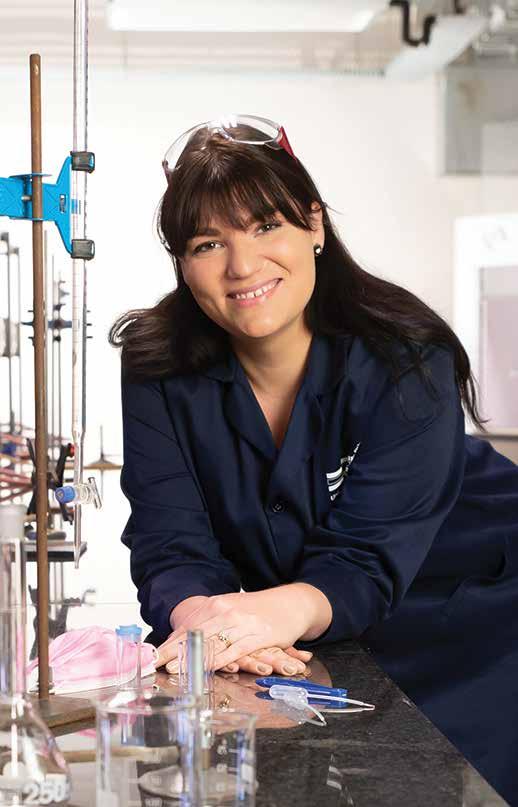




Dr Marié Hattingh is a lecturer in the Department of Informatics, Faculty of Engineering, Built Environment and Information Technology and holds the following degrees: BMil (BSc), BMil honours, MMil (Technology), and a PhD in Informatics. She lectures in critical thinking and problem solving, systems analysis and design at undergraduate level, and human-computer interaction at postgraduate level.
Dr Hattingh’s research focuses on the role of social media in communities. She takes an interdisciplinary view when applying either qualitative or quantitative approaches to study the use of social media. She is generally interested in social media’s influence on its users, positive and harmful use of social media (dark web, fake news, narcissism and addiction), learning opportunities, and the moral and ethical consequences of social media use.
She recently received important recognition and awards from the Department of Informatics, University of Pretoria, including the highest student evaluation on postgraduate level (2019), Academic Achievers Teaching and Learning Excellence Award (2020) and the Department of Informatics award for the Highest Research Output (2017, 2019, 2020).
She coordinates the Bachelors in Information Technology in Information Systems (BIT IS) programme and is the departmental marketing representative. Dr Hattingh is the honourary treasurer of the organisation for South African Information Communication Technologist (SAICSIT) and the assistant editor of the South African Computer Journal (SACJ). In 2019 she was the organising co-chair of the International Federation of the treatment of Information (Féderation Internationale pour le traitement de l’information) Working Group (IFIP WG 6.11 I3E2020) conference.
She has authored and co-authored 25 journal articles and delivered 16 conference papers at local and international conferences.
Dr Hattingh received a Y2 rating from the NRF.






The Community Engagement Award is awarded annually to one individual to recognise community engagement as a long-standing and valued tradition in higher education and an extensive, high-impact practice in teaching at the University of Pretoria.
The criteria for the award are aligned to those for the MacJannet Award, which is internationally administered by the Talloires Network.
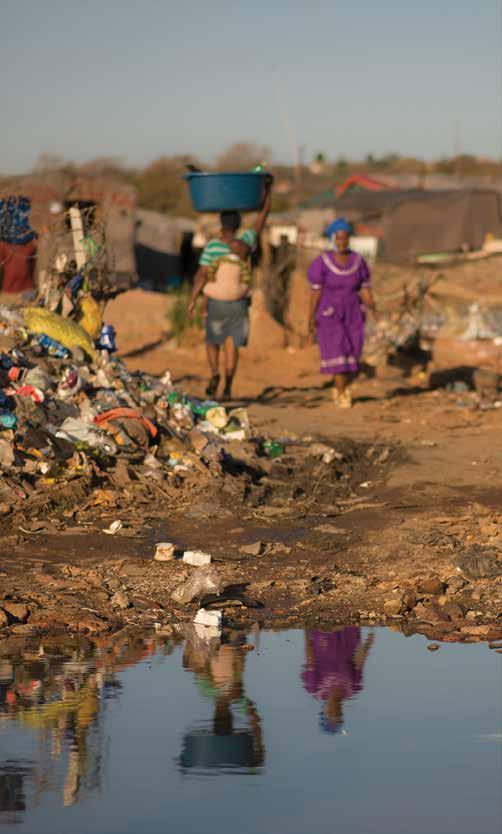





Professor Jannie Hugo is a professor emeritus who retired as Head of Department of Family Medicine in January 2021. He is currently the Director of the UP Community Oriented Primary Care (COPC) Research Unit.
The implementation of COPC includes community-oriented substance use interventions such as harm reduction, opioid substitution therapy, substance use, and infectious diseases. Research is done on the quality of life, retention in care, nature and the functioning of the illicit drug trade, and the entry of prisoners with HIV and addiction into the community. Primary care also includes care for homeless people, non-communicable disease care in the community, such as diabetes mellitus, early detection and treatment of tuberculosis, and mask testing at home. The implementation of COPC concerning occupational mine health includes the social responsibility of mining companies, health impact assessments in mining host communities and care coordination between homes, clinics, and hospitals.
Prof Hugo is also involved in setting up a long-term community and household-based surveillance site as part of the GRT (Gauteng Research Triangle) initiative. This project is run in partnership with Wits and the University of Johannesburg as part of SAPRIN (South Africa Population Research Infrastructure Network). The platform is developed in Melusi (a fast growing informal settlement in Pretoria West), Atteridgeville and Hillbrow.
In collaboration with Anglo-American, the Unit implements integrated health and development solutions in many mining communities. This work is done with the impact catalyst lead by the Council for Scientific and Industrial Research (CSIR).
Prof Hugo is the deputy chairperson of the Gauteng Provincial Health Research Committee and a member of the Gauteng Substance Use Forum.
He recently received a lifetime award for innovation, research, and service by the South African Medical Association in 2018 and the UP Health Sciences Award on Community Engagement in 2020.






Dr Amanda Talma is a part-time senior lecturer in the Department of Family Medicine in the School of Health Sciences. She currently manages the Longitudinal Community Attachment for Students (LCAS) programme for first- to fourth-year medical students. She worked in local authority primary care clinics for 30 years before joining the LCAS programme in 2008.
In the LCAS, students learn how to consult patients focusing on the holistic (bio-psycho-social-spiritual) approach. They experience integrated primary healthcare outside the hospital environment (from the home to the hospital/clinic and back).
The students visit retirement homes, early childhood development centres, centres for people with special needs, non-governmental-organisations serving key populations, primary health care clinics, palliative care centres and shelters. During the four years, students visit different households accompanied by community health workers.
To achieve optimal community engagement, the LCAS provides students with a unique experiential learning opportunity. They gain knowledge of healthcare outside the hospital environment and can perform holistic consultations by their final year.
The most significant achievement of the LCAS is its ability to introduce future generations of doctors to the daily activities and living conditions of most people and communities in South Africa. The students experience health care services rendered by different providers outside their formal training environment. They see the difference that health careers make in the daily lives of their clients/communities at grassroots level. The communities also get to know young doctors as ordinary human beings in the comfort and safety of their homes.
“To study medicine without books is to sail an uncharted sea, to study medicine only from books is not to go to sea at all.” – Sir William Osler.
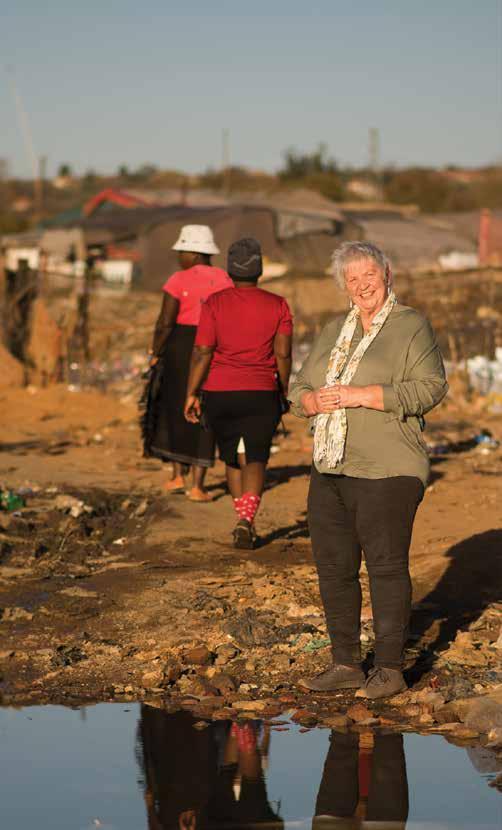




The University of Pretoria confers three awards under The Conversation Africa Science Communication Awards category. The Conversation Africa gives all higher education institutions an opportunity to share their research outputs with fellow academics across the globe as well as with civil society. The platform therefore places academics in a better position to identify opportunities to collaborate and conduct research with their peers across disciplines. Our partnership with The Conversation Africa has increased the visibility of the work of UP researchers and academics, helping them reach wider audiences beyond academic research communities.






for the period of 1 January 2020 – 31 December 2020.

Professor Wanda Markotter is a full professor in the Department of Medical Virology, Faculty of Health Sciences. She is also the Director of the Centre for Viral Zoonoses, Department of Science and Innovation and administered by the National Research Foundation (NRF-DSI) South African Research Chair in Infectious Diseases of Animals (Zoonoses) and Research Chair at Future Africa in People, Health and Place.
She is a virologist who has been involved in an interdisciplinary research programme on disease ecology in bat species in South Africa and other African countries since 2005. The research includes extensive fieldwork focusing on bats and potential spillover hosts, virological testing, bat biology, ecological investigations and human behaviour studies. The focus is not only to detect viruses but also to understand spillover factors and develop mitigation strategies.
Her research is supported by several multi-collaborative international viral surveillance programmes, including the Global Disease Detection Programme, Centres for Disease Control and Prevention and Defence and Threat Reduction Agency, USA. She also leads transdisciplinary initiatives focused on One Health and plays a leading role as co-chair of the One Health expert panel advising the World Health Organisation, the World Organisation for Animal Health (OIE), Food and Agriculture Organization (FAO) and the United Nations Environment Programme (UNEP). In 2020 she was a finalist in the TW Kambule-NSTF (National Science and Technology Forum) Awards researcher category.
Prof Markotter received a C1 rating from the NRF.
UP Author with the most articles published on The Conversation Africa in 2020

Professor Daniel Bradlow is the South African Research Chairs Initiative (SARChI) Professor of International Development Law and African Economic Relations in the Centre for Human Rights, Faculty of Law, University of Pretoria, and an emeritus professor at the American University, Washington College of Law. He is responsible for the internationally renowned LLM in International Trade and Investment Law for African Lawyers.
His research currently focuses on public finance and human rights, and global economic governance. His most recent publications include chapters in Advocating Social Change through International Law: Exploring the Choice between Hard and Soft International Law, Daniel D. Bradlow and David B. Hunter, eds, (Brill 2019), and Values, Interests, and Power: South African foreign policy in uncertain times, Daniel D. Bradlow and Elizabeth Sidiropoulos, eds, (PULP 2020).



He is currently working on projects relating to African sovereign debt; on a book on international law and international financial institutions, and on the next editions of his co-authored textbooks on international law and negotiating international business transactions.
He was previously the head of the International Economic Relations and Policy Department of the South African Reserve Bank, Chair, Roster of Experts, Independent Review Mechanism of the African Development Bank, and Director, International Legal Studies Program, American University Washington College of Law. He is a member of the Academy of Science of South Africa (ASSAf).
Prof Bradlow received a B1 rating from the NRF.
UP Author with the most articles published on The Conversation Africa in 2020

Professor Henning Melber is a political scientist and a sociologist focusing mainly on African and development studies and global governance, specifically in southern Africa. He has been an extraordinary professor at the Department of Political Sciences since 2012. As director emeritus of the Dag Hammarskjöld Foundation and former research director of the Nordic Africa Institute, both in Uppsala, Sweden, Prof Melber remains affiliated to both institutions. He has also served as an extraordinary professor at the Centre for Gender and Africa Studies at the University of the Free State since 2013 and senior Research Fellow with the Institute for Commonwealth Studies at the University of London since 2015. He has been the President of the European Association of Development Research and Training Institutes (EADI) since 2017.
Prof Melber is an internationally acclaimed researcher, acknowledged and commended for building relations between scientific communities in Europe and Africa. In 2020 he received The Conversation Africa Science Communication Award from UP in the science category for which he has written 38 articles reaching about 775 000 readers. He has authored and co-authored and edited and co-edited 59 books and co-authored over 500 book chapters and journal articles.
Prof Melber received a B2 rating from the NRF.

A-rated researchers
B-rated researchers
C-rated researchers
Y-rated researchers






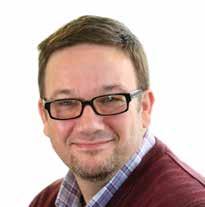
Professor Michael Bruford is an extraordinary professor in the Department of Biochemistry, Genetics, and Microbiology. He is professor of biodiversity in the School of Biosciences and Dean for Environmental Sustainability at Cardiff University in Wales, UK. Prof Bruford co-chairs the International Union for Conservation of Nature (IUCN) Conservation Genetics Specialist Group and is the academic lead for the Welsh Government’s Biodiversity and Ecosystem Evidence Research Needs Programme. He serves on the editorial boards of Conservation Genetics Resources, Frontiers in Genetics, Integrative Zoology, and Endangered Species Research. He was a founding editor for the journal Animal Conservation and served as Editor-in-Chief of Heredity between 2012 and 2016.
His research concerns understanding genomic diversity and adaptation in threatened species and using the data to model and predict their future pathways in the face of climate change. He is a strong advocate of biodiversity biobanking and is director of the Frozen Ark, a globally endangered species biobank charity, and CryoArks, the UK’s zoological biobank.
In 2020, Prof Bruford was elected a member of the Academia Europaea, received the Marsh Award for Conservation Biology, and was awarded the Chimelong Medal of the China Zoological Society.
Prof Bruford received an A2 rating from the NRF.

Professor Charles Van Onselen
Professor Charles van Onselen is a research professor at the Centre for the Advancement of Scholarship and is affiliated with the Department of Historical and Heritage Studies, Faculty of Humanities.
He is an internationally renowned historian whose overarching interest lies in how the histories of predominantly southern African societies have intersected with developing social, economic, and political structures elsewhere, mainly in the late 19th and early 20th centuries. His concern is the interconnectedness between developments in southern Africa and broader worldwide trends.
He has been awarded the Sunday Times Literary Award for non-fiction (1997 and 2008), the Herskovitz Prize of the USA African Studies Association (1997), and the Academy of Science of South Africa (ASSAf) Humanities Book Award Prize (2021).
Prof Van Onselen received an A1 rating from the NRF.

Professor Johannes van Oort is an extraordinary professor of patristics and early Christianity, Faculty of Theology and Religion. He is an emeritus professor of Utrecht University (1983–2000) and Radboud University, Nijmegen (1999–2014) and has been affiliated with UP since 2000.
Prof Van Oort published over 30 books and innumerable articles in his fields of research, mainly on the early Christian philosopher and theologian Augustine, on Gnosticism (especially on the worldwide dualistic movement of Manichaeism), on reformers like Luther and Calvin, and on early-modern Christianity. He has been the editor of the scientific journal Vigiliae Christianae (Leiden-Boston: Brill), the book series Supplements to Vigiliae Christianae, the Nag Hammadi and Manichaean Studies (both Leiden-Boston: Brill), the UNESCO-funded Corpus Fontium Manichaeorum (Turnhout: Brepols) and the Patristic Studies (Leuven: Peeters) for many years. He is a member of several international societies and a past president and honorary member of the International Association of Manichaean Studies. In 2010, he was honoured with the Festschrift In Search of Truth: Augustine, Manichaeism and other Gnosticism. Studies for Johannes van Oort at Sixty (Leiden-Boston: Brill, reprinted in 2017). He authored a collection of poems (1993, reprinted in 2021) and an Oratorium on Judas Iscariot (2008).
Prof Van Oort received an A2 rating from the NRF.


Professor Marthán Nieuwoudt Bester is emeritus professor in the Mammal Research Institute (MRI) in the Department of Zoology and Entomology, Faculty of Natural and Agricultural Sciences at UP. He primarily researches the population biology and ecology of marine mammals in the Southern Ocean. His current focus is on the foraging ecology of Ross and Weddell seals in the Weddell Sea, Antarctica, and the population status and foraging behaviour of subantarctic fur seals around Tristan da Cunha (TdC) in the South Atlantic ocean. The latter research project is in collaboration with the Marion Island Marine Mammal Programme, within which he was co-investigator until recently.
He is a TdC Biodiversity Advisory Group (TBAG) member and honorary conservation officer of TdC and an alumnus of the Hanse-Wissenschaftskolleg (Institute for Advanced Study), in Delmenhorst, Germany. He serves on the editorial board of Polar Biology and is a review editor for Marine Ecology Progress Series (MEPS). Inducted as a Fellow of the Royal Society of Southern Africa (RSSAf), he also received the Gold Medal of the Zoological Society of Southern Africa (ZSSA) in 2019.
Prof Bester received a B2 rating from the NRF.
Professor Lyn-Marie Birkholtz is a full professor in Biochemistry in the Department of Biochemistry, Genetics and Microbiology and director of a South African Research Chair (SARChI) in ‘Sustainable Malaria Control’. She leads the parasite cluster within the UP Institute for Sustainable Malaria Control. She is trained as a geneticist, human physiologist and biochemist and received her PhD in biochemistry at the University of Pretoria (jointly performed in South Africa and Germany), followed by postdoctoral fellowships in Germany and the United States of America. Prof Birkholtz is an elected member of the Academy of Science of South Africa. UP recognised her as an exceptional young researcher in 2010 and 2013 and an exceptional academic achiever for 2019-2021. She received the Vice Chancellor’s Exceptional Supervisor Award in 2018 and the NSTF Science Communication Award in 2018 and is a finalist for the NSTF TW Kambule Researcher Award for 2021. As principal investigator of the Malaria Parasitology Molecular Laboratory (M2PL), she has a keen interest in the fundamental processes driving parasitism and the challenges it poses to global health. Prof Birkholtz is leading efforts at targeting malaria parasites to contribute to malaria elimination strategies and contribute to the global ‘Malaria Eradication Agenda’.
Prof Birkholtz received a B2 rating from the NRF.
Professor Wilhelm de Beer is an associate professor in microbiology in the Department of Biochemistry, Genetics and Microbiology, Faculty of Natural and Agricultural Sciences. He conducts research in the Forestry and Agricultural Biotechnology Institute.
He is a mycologist and tree pathologist whose research focuses on various aspects of the fungal symbionts of bark and ambrosia beetles. Over the past 20 years, he has collaborated with scientists in several research projects from more than 15 countries. He currently coordinates research on the polyphagous shot hole borer invasion that kills thousands of trees in South Africa. He focuses on taxonomy, phylogenetics, evolution, symbioses, pathogenicity, and the population and invasion biology of bark and ambrosia beetle-associated fungi. He has authored more than 160 publications in this field, was editor of a book and is associate editor of two international subject journals.
Prof De Beer received a B3 rating from the NRF.

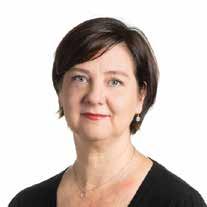





Professor Marcel de Jeu is an extraordinary professor in the Department of Mathematics and Applied Mathematics, where he focuses on functional analysis and specialises in representation theory in vector lattices and Banach lattices. He is the holder of a European Union Erasmus+ International Credit Mobility exchange grant between Leiden University and the University of Pretoria and an exchange grant between Leiden University and Sichuan University in Chengdu, China.
Prof De Jeu is the chairman of the steering committee for the positivity conferences. He has been the main editor of several conference proceedings and special issues of journals and has organised several international conferences and workshops.In the past three years, he has served on the scientific committee of the international conference, “Operator Theory and Differential Equations”, scheduled to be held in Vladikavkaz, Russia, from 26 to 30 July 2021, but which has been postponed.
He currently serves on the scientific committee of the international conference “Positivity XI”, to be held in Ljubljana, Slovenia, from 10 to 14 July 2023, where he will also present a paper. Furthermore, he has given lectures at workshops such as “Operator theoretic aspects of ergodic theory”, at the Christian-Albrechts-Universität, Kiel, Germany, the international conference “Positivity X”, in Pretoria, South Africa, and the Conference on Ordered Structures with Applications in Economy and Finance.
Prof De Jeu received a B2 rating from the NRF.
Professor Charl de Villiers is professor of accounting at the University of Pretoria. He is also professor of accounting at the University of Auckland, New Zealand, an adjunct professor at the University of Cape Town, South Africa, and the Universiti Teknologi Mara in Malaysia. Prof De Villiers’ research interests include sustainability accounting and integrated reporting.
Prof De Villiers has produced well over 300 research-based publications and presentations, including more than 90 articles in refereed journals and two Routledge published edited books, namely Sustainability Accounting and Integrated Reporting (2018) and The Routledge Handbook of Integrated Reporting (2020). According to Google Scholar (Scopus), his research has been cited more than 6 000 (2 500) times, and his h-index is 41 (25). Prof De Villiers received the 2019 University of Auckland Business School Research Excellence Award. He serves on the editorial boards of several top accounting journals, and he is Editor-in-Chief of Meditari Accountancy Research (ranked A by the ABDC). He plays an active role in promoting sustainability accounting and integrated reporting research in South Africa, New Zealand and Australia, having established and still serving as Chair of the steering committee of the Sustainability Accounting Research Network and its annual Conference. He was President of AFAANZ (Accounting and Finance Association of Australia and New Zealand) from 2018 to 2020.
Prof De Villiers received a B1 rating from the NRF.

Professor Ina Fourie is a full professor and Head of Department of Information Science, Faculty of Engineering, Built Environment and Information Technology.
She specialises in health information behaviour with specific reference to cancer, palliative care, pain and research methods such as autoethnography. She also focuses on information literacy and workplace information literacy.
She plays a leading role in international organisations such as the Association of Information Science & Technology (ASIS&T) and the Information Seeking in Context (ISIC) steering committee. She has produced more than 130 publications, including articles, conference papers, chapters in books and four books that she authored, edited or co-authored including Navigating digital information literacy and How LIS professionals can use alerting services. Auto-ethnography for librarians and information scientists (editor) and Third space, information sharing and participatory design (co-author) will be published in 2021. In 2020 she was instrumental in successfully hosting the ISIC2020 conference virtually.
Prof Fourie received a B2 rating from the NRF.



Professor Kobus Kok is extraordinary professor in the Department of New Testament and Related Literature, Faculty of Theology and Religion. He is also professor of New Testament and co-director of the Research Centre for Early Christianity at the Evangelische Theologische Faculteit Leuven, in Belgium. Prof Kok’s research focuses on the social-scientific exegesis of the source documents of early Christianity, especially on the dynamics of identity and boundary construction. He is the first New Testament scholar to use the social identity complexity theory as a heuristic tool in New Testament studies.
Many of his master’s and doctoral students have since used social-scientific exegetical methodology in combination with Classical Exegesis with great success, as evidenced in co-publications in highly rated journals with high impact factors like HTS Hervormde Teologiese Studies which is listed with ISI. From 2014 onwards, Prof Kok was an NRF Y1 rated scholar. His most recent monograph was published with Brill’s Biblical Interpretation series, an international A-rated publication. In 2019 Prof Kok was elected as a member of the prestigious Studiorum Novi Testamenti Societas.
Prof Kok received a B3 rating from the NRF.
Professor Peter le Roux is an associate professor in the Department of Plant and Soil Sciences, Faculty of Natural and Agricultural Sciences. He is a community ecologist whose research focuses on the impacts of climate change, with a specific interest in how biotic interactions will be affected by, and may potentially mediate the effects of, changing environmental conditions. Prof Le Roux’s research is chiefly conducted on plant communities in extreme environments, including the windy sub-Antarctic tundra of Marion Island, the arid Nama Karoo and the cool alpine grasslands of the Drakensberg. This research provides insight into ways to improve forecasts of the ecological consequences of climate change and highlights the need to move beyond predictions based chiefly on coarse-scale temperature and precipitation data.
Prof Le Roux is involved in several local and international research projects, and collaborates closely with researchers working in other tundra and alpine systems globally. One of his recent research highlights is the publication of a study demonstrating a globally consistent pattern across the tundra biome in the relationship between plant community structure and fine-scale environmental variation (Kemppinen et al. 2021, Consistent trait–environment relationships within and across tundra plant communities, Nature Ecology and Evolution).
Prof Le Roux received a B3 rating from the NRF.
Professor Johan Malherbe was Head of the Department of Physics at the University of Pretoria and currently serves as professor in the same department.
During his sabbaticals, he researched with the leaders in surface physics, Siegfried Hofmann and Peter Sigmund, and others at various well-known research institutes and universities all over the world. Prof Malherbe has covered virtually every aspect of particle bombardment effects on solids in publications. He is renowned for models and experiments to explain preferential sputtering and its phenomena and for models and experiments in topography development on semiconductor materials. Because of his expertise, Prof Malherbe has often presented plenary lectures at international conferences and written review papers on various aspects of ion-solid interactions by invitation. Recently, he also started working on materials problems connected to the nuclear power industry. He was invited to write a review paper on silicon carbide (SiC) and presented talks including several invited talks on nuclear materials at several conferences. He has served on numerous international and national committees, many as chairperson. He has produced over 200 scientific publications and has supervised 29 PhD and MSc students while another five are still to complete their studies.
Prof Malherbe received a B1 rating from the NRF.





Professor Willie Nicol from the Department of Chemical Engineering is professor in bioreaction engineering. His research entails producing platform chemicals such as succinic and fumaric acid from sugar, using natural bacteria and fungi. Bioreactor control is at the core of research where liquid composition is manipulated to drive the desired responses from micro-organisms. He has a Scopus H-index of 16.
Recently his research focus has shifted to include microbial consortia and edible plants where various biochemical processes for sustainable, soilless food production are investigated. These processes include hydroponics, Azolla growth for nitrogen fixation, aerobic and anaerobic digestion, biofiltration/conversion and aquaculture. The main focus is on recycling nutrients in soilless food production to minimise the effects of fertiliser use and nutrient spillage on the environment. It is envisaged that biochemical process control will become a crucial tool for sustainable food production in the circular economy.
Prof Nicol received a B3 rating from the NRF.

Professor Sue Nicolson is an emeritus professor in the Department of Zoology and Entomology, Faculty of Natural and Agricultural Sciences, and a senior research fellow at the Centre for the Advancement of Scholarship.
Her research focus is on physiological aspects of pollination biology, looking at pollination from the point of view of the animals involved rather than the plants. Significant topics in recent years included the nutritional value of nectar and pollen, the extreme osmotic and energetic challenges for birds drinking dilute nectars, honeybee nutritional physiology and the effects of nectar toxins and pesticides on pollinators. Her interest in both bee and bird pollinators focuses on the mechanisms of drinking in honeybees and the digestive physiology of nectar-feeding birds.
Floral resources for good nutrition are vital to the health of all pollinators. Prof Nicolson is currently co-editing and contributing to a special issue of Philosophical Transactions B on the topic From floral chemistry to landscapes: the natural processes influencing pollinator health.
Prof Nicolson received a B1 rating from the NRF.

Professor Llewellyn Padayachy is head of the Department of Neurosurgery, Faculty of Health Sciences. He is a paediatric neurosurgeon and is internationally renowned for his expertise in minimally invasive surgical techniques in pediatric brain tumour surgery and hydrocephalus. He has served on the executive boards of various international neurosurgical societies and has served on the scientific advisory board of the European Society for Pediatric Neurosurgery (ESPN).
His main research focus is on non-invasive diagnostic and minimally invasive surgical techniques in paediatric and adult brain tumours, hydrocephalus and brain trauma. This work has resulted in numerous high impact publications, invited talks, international patents and a spin-off company to develop and commercialise a novel technique for detecting raised intracranial pressure. He has been the recipient of various awards and scholarships, has delivered over 75 invited international lectures, and has presented at more than 50 neurosurgery educational courses.
Prof Padayachy has established multiple collaborative research projects with Oxford University, England, Baylor College of Medicine (BCM), USA and SINTEF, Norway. As a result, he has served as guest editor of a focus session for the prestigious journal Child’s Nervous System, been part of an esteemed international expert panel on the use of ultrasound in neurosurgery, serves as a reviewer for 20 international journals and has been awarded an honorary appointment as clinical professor at Baylor College of Medicine.
Prof Padayachy received a B2 rating from the NRF.



Professor Nelishia Pillay is a professor at the University of Pretoria. She holds the MultiChoice joint chair in machine learning and SARChI Chair in Artificial Intelligence. She is chair of the Institute of Electrical and Electronics Engineers (IEEE) technical committee on intelligent systems applications, IEEE task force on hyper-heuristics and the IEEE task force on automated algorithm design, configuration and selection.
Her research areas include hyper-heuristics, automated design of machine learning and search techniques, combinatorial optimisation, genetic programming, genetic algorithms and deep learning. The current focus of her research is applying artificial intelligence to solving problems related to attaining the sustainable development goals outlined by the United Nations, which has provided a platform to facilitate interdisciplinary research.
She has established the Nature-Inspired Computing Optimization (NICOG) research group, which focuses on developing and applying artificial intelligence techniques to solve real-world problems. She has published on these topics in journals and at national and international conference proceedings. She has served on committees for numerous national and international conferences and reviews various international journals.
Prof Pillay received a B2 rating from the NRF.
Professor Tahir Pillay is a joint staff member of UP/National Health Laboratory Service (NHLS) and professor and Head of Department of Chemical Pathology and NHLS Pathology, Faculty of Health Sciences. He is president of the South African Association of Clinical Biochemistry and Laboratory Medicine (SAACB), Editor-in-Chief of the Journal of Clinical Pathology (BMJ group) and chair of the communications and publication division’s executive committee of the International Federation of Clinical Chemistry and Laboratory Medicine (IFCC). Prof Pillay is also an honorary professor at the University of Cape Town (UCT). He was head of chemical pathology at UCT, Deputy Vice-Chancellor at the University of KwaZulu-Natal, and Deputy Director of the Institute of Cell Signalling, University of Nottingham, UK.
Prof Pillay’s research focuses on the molecular cell biology of insulin signalling, molecular modelling of ligands and receptors and the development of new diagnostic probes for laboratory diagnostics using recombinant DNA technology. He is pioneering the application of single-domain antibodies/nanobodies for the development of rapid diagnostic tests.
Prof Pillay’s group received the first prize in the 2020 Gauteng Accelerator Programme (GAP) Innovation Awards presented by the Innovation Hub and Emory University to develop a nanobody-based test for COVID-19.
Prof Pillay received a B3 rating from the NRF.
Professor Christian Pirk is a full professor in the Department of Zoology and Entomology at the University of Pretoria, a member of the Academy of Science of South Africa and a Fellow of the African Academy of Science. Prof Pirk leads the Social Insects Research Group, a vibrant group of more than 20 members, including faculty members, visiting researchers, postdoctoral and postgraduate students.
His main research interest is in social insects, using a multi-disciplinary approach by combining mathematics, chemical ecology, behavioural studies, population analysis and molecular ecology. One research focus lies in the reproductive division of labour in honeybees, the resulting potential conflicts among members of an insect colony and the role of chemical ecology in resolving these conflicts. His research into pollinator’s ecology and pollinator’s health, including the effects of neonicotinoid pesticides, contribute directly to food security and sustainable agriculture. Prof Pirk also works on finding sustainable and viable solutions to Africa’s big health problems, like vector-borne diseases. Moreover, researching self-organisation in social insects, the organisation of groups, mechanisms of coordination and task allocation, and the role and means of communication in achieving coherent collective behaviour have applications in industrial processes. Prof Pirk has produced more than 140 publications that appeared in peer-reviewed journals, wrote several book chapters and published a book together with two colleagues on honey bee nests. His h-index is 31, and he has been cited more than 3300 times to date.
Prof Pirk received a B3 rating from the NRF.





Professor Emil Roduner is an extraordinary professor in a strategic 50% post-retirement position in the Department of Chemistry, Faculty of Natural and Agricultural Sciences.
His experimental research activities relate to the electrochemical conversion of carbon dioxide and water to liquid solar fuels. This has resulted in a high-efficiency conversion of formic acid, the first intermediate of the complex electro-reduction, to a >80% yield of renewable alcohols, using indium oxide as a novel electrocatalyst. The project aims at a South African contribution towards the worldwide transition to carbon-neutral energy resources. Besides this, and benefitting from life-long teaching activities, he has written an advanced textbook entitled Optical Spectroscopy – Fundamentals and Advanced Applications, together with his colleagues Patricia Forbes and Tjaart Krüger from the University of Pretoria and the former student Katharina Kress from the University of Stuttgart. Furthermore, he is engaged in the fundamental question of the origin of irreversibility in thermodynamics and the nature and origin of life on earth and elsewhere in the universe.
Prof Roduner received a B2 rating from the NRF.

Professor Egmont Rohwer is professor of analytical chemistry and a former Head of the Department of Chemistry. His research at the University of Pretoria since 1983 focuses on chromatography and mass spectrometry to establish the chemical composition of complex mixtures. This is done to address research problems in fields ranging from engineering, biology, geology and archaeology to forensic, environmental, medical and food sciences. Nine years ago, he also initiated a long-term project to convert sunlight and CO2 to liquid fuels, to address global warming and ways to unlock the potential of South Africa as an exporter of sustainable fuels. He finds designing new instrumentation and developing customized analytical methods to, for example, research pheromone communication in insects, environmental pollution, human aroma perception and compounds emitted by the human skin, highly challenging. Skin volatile profiles show promise to diagnose illnesses like TB and malaria. These profiles could also lead to improved baiting traps to control malaria mosquitoes.
In 2019 he received the Georg Forster Research Award from the Alexander von Humboldt Foundation. The award honours researchers from developing and transition countries who have earned international recognition for their research and seek to solve development-related issues.
Prof Rohwer received a B3 rating from the NRF.

Professor Pavel Selyshchev
Professor Pavel Selyshchev is a professor in the Department of Physics, Faculty of Natural and Agricultural Sciences.
Prof Selyshchev developed the theory of Complex Systems and applications to the physics of condensed matter. He investigates processes of self-organisation and formation of dissipative structures in open systems, their evolution and development, the kinetics of nonequilibrium and nonlinear processes, and the influence of stochastic factors on all these phenomena. The core of all his investigations is the search for nonlinear feedbacks and the establishment of the role of these connections in the development of nonequilibrium structures in different physical systems.
Prof Selyshchev’s research focuses on theoretical models that describe the change of properties of materials under irradiation both on micro and macro levels. The first is point defect aggregation, growth of voids and clusters, diffusion and diffusion-controlled reactions, and formation of nanostructures. The second is self-oscillations of crystal temperature and crystal properties, travelling wave of defect annealing, creep and hardness, and phase transformations.
Other subjects include theoretical models that describe nonlinear phenomena in liquids, gels, and polymers in external fields, overlapping rapid heavy ion tracks in solids, reaction-rate with the account of the crystal anharmonicity, and accumulation of oxygen clusters in silicon.
Prof Selyshchev received a B2 rating from the NRF.



Professor Ann Skelton is professor in the Department of Private Law, Faculty of Law, where she holds the UNESCO Chair in education law in Africa and is regarded as a world-renowned expert on international human rights law pertaining to children. She is the first incumbent in the Rotating Chair: Enforcement of Children’s Rights at the University of Leiden (the Netherlands), is a visiting professor at the University of Strathclyde and teaches in the international human rights master’s course at the University of Oxford (England). In South Africa, she has blended academia with practice as an advocate, and has argued several landmark cases in the Constitutional Court. She has shaped child law and education law jurisprudence through her leadership as a strategic litigator. On the international stage, she was re-elected in 2020 to serve on the United Nations Committee on the Rights of the Child for a second term, where she chairs the complaints procedure. She was the chairperson of the advisory board for the United Nations Global Study on children deprived of their liberty, which was presented to the General Assembly in 2019, and she chaired an international expert group that drafted the Abidjan Principles on the right to education.
Prof Skelton received a B1 rating from the NRF.
Professor Bernard Slippers is the director of the Forestry and Agricultural Biotechnology Institute (FABI) and Innovation Africa@UP initiative. He is the founding director of the Future Africa Institute and a professor in the Department of Biochemistry, Genetics and Microbiology. Prof Slippers leads the Tree Protection Co-operative Programme and is a core team member of the Centre of Excellence in Plant Health Biotechnology in FABI.
His research focuses on the ecology and evolution of insects and microorganisms that affect plant health and the development of tools to mitigate their impact. He has received wide recognition for his research, is a highly cited researcher (Clarivate Analytics) and a recipient of the Havenga Prize for Life Sciences. He has published more than 250 papers, an edited book, and several book chapters, which have been cited more than 12900 times.
Prof Slippers is passionate about science development. He is a founding member of the Global Young Academy (GYA) and the South African Young Academy of Science (SAYAS). He has served in the leadership of these organisations, which includes co-chair of the GYA. He has also initiated and led the Africa Science Leadership Programme and is an elected fellow of the Academy of Science of South Africa.
Prof Slippers received a B1 rating from the NRF.
Professor Emma Steenkamp is a full professor in the Department of Biochemistry, Genetics and Microbiology, Faculty of Natural and Agricultural Sciences. She is the Director of the DSI-NRF (Department of Science and Innovation-National Research Foundation) Centre of Excellence in Plant Health Biotechnology hosted by the Forestry and Agricultural Biotechnology Institute (FABI) at the University of Pretoria. She also serves on the management committee of FABI.
Prof Steenkamp is a specialist in microbial systematics and evolution. She has authored or co-authored more than 140 peer-reviewed articles in International Scientific Indexing (ISI)-rated journals, and her work has been cited almost 4500 times in scientific literature. Under her supervision/co-supervision, 18 PhD and 34 MSc students have graduated and she currently supervises/co-supervises 13 MSc and 10 PhD students. She also leads a number of mentorship and internship programmes.
Prof Steenkamp has received the Exceptional Young Scientist and the Exceptional Academic Achiever Awards of the University of Pretoria. She serves on the Subcommittee for Taxonomy of Rhizobium-Agrobacterium, which is one of the working groups of the International Committee on Systematics of Prokaryotes. She is a council member of the Southern African Society for Systematic Biology and the South African Society for Microbiology. She also serves on the editorial boards of the ISI-rated European Journal of Plant Pathology and the recently established journal, Scientific African, owned by the Next Einstein Forum.
Prof Steenkamp received a B2 rating from the NRF.





Professor Alta van der Merwe is currently the Deputy Dean: Teaching and Learning in the Faculty of Engineering, Built Environment and Information Technology.
She is also a full professor in the Department of Informatics, where she provides supervision to postgraduate students. Prof Van der Merwe focuses on designing socio-technical solutions with research activities in Enterprise Architecture, Society 5.0 and different theories supporting the successful use of technology in the organisation. Her research, related to her position as Deputy Dean: Teaching and Learning, focuses on student success and the use of technology to enhance throughput. She is the past president of the South African Institute of Computer Scientists and Information Technologists (SAICSIT). On an international level, she was involved in the proposal and acceptance of the Institute of Electrical and Electronics Engineers (IEEE) SMC Enterprise Engineering and Enterprise Architecture Technical Committee, where she still acts as co-chair. In 2018 she was appointed as the International Federation for Information Process (IFIP) 8 Vice-Chair, and until 2020 she was also the South African representative for the International IFIP 8 committee.
Prof Van der Merwe received a B3 rating from the NRF.

Professor Ernest van Eck is a professor in New Testament and Head of Department of New Testament and Related Literature. He was appointed as Deputy Dean: Research and Postgraduate Studies of the Faculty of Theology and Religion in 2019.
He is currently the assistant editor of the journal HTS Theological Studies, co-chair of the Program Unit: Social-scientific readings of the New Testament of the international Society of Biblical Literature, and a member of Studiorum Novi Testamenti Societas (SNTS).
Prof Van Eck is the author of 51 and co-author of 32 peer-reviewed articles, 11 book chapters, the editor of two books, and the author of two monographs. His publications cover topics such as interpreting the Synoptic, pseudepigraphical, and apocryphal gospels, Pauline literature, sexuality in the ancient world, historical Jesus studies, the social-scientific approach to the interpretation of ancient texts, and the parables of Jesus. His most recent monograph, The parables of Jesus the Galilean: Stories of a social prophet, is the culmination of a decade of the study of the parables of the historical Jesus, as opposed to the parables of Jesus as recorded in the canonical and apocryphal gospels.
Van Eck received a B2 rating from the NRF.

Professor Braam van Wyk is an emeritus professor of botany in the Department of Plant and Soil Sciences, Faculty of Natural and Agricultural Sciences. Although a plant taxonomist by training, his interest is more that of a naturalist. Hence he considers himself a generalist rather than a specialist. Prof Van Wyk has authored and co-authored over 430 publications, including 16 books, and supervised and co-supervised 31 MSc and 28 PhD students. Among his publications are botanical field guides, accessible to the layperson and widely used by students and scientists. Prof Van Wyk and his students and collaborators’ research is primarily taxonomic-anatomical, resulting in improved classifications and a better understanding of the anatomy of several groups of plants. This includes the discovery of new structures, species, genera and even a family of flowering plants. Contributions have also been made towards many other fields, including biogeography, ecology, ethnobotany, floristics, biological conservation, pasture science, veterinary science, bacteriology, bryology and mycology. Prof Van Wyk is the recipient of several honours and awards, the more recent being the South African Association of Botanists Gold Medal (2018). This award is the premier acknowledgement for outstanding botanical research and contributions to the advancement of botany in South Africa.
Prof Van Wyk received a B2 rating from the NRF.



Professor Venkata Yadavalli is a professor and head of the Department of Industrial and Systems Engineering, Faculty of Engineering, Built Environment and Information Technology. His research focus is on inventory management, particularly humanitarian logistics.
Prof Yadavalli undertook a literature study on positioning disaster inventory, which is a difficult task due to the stochastic nature of the occurrences of disasters in a particular region. He began his research in reliability engineering and published over 50 research papers related to reliability engineering alone. Prof Yadavalli has published over 180 papers investigating other fields such as hospital management, queueing systems and inventory systems.
He successfully supervised 22 PhD students and 20 master’s students. He is a Fellow of the Royal Statistical Society, a Fellow of the South African Statistical Association and a Fellow of the Industrial Engineering and Operations Management Society, United States of America (USA). Prof Yadavalli was a team leader for the three NRF funded projects. Prof Yadavalli received the Excellence Award from the Association of Inventory Academicians and Practitioners and is a life member of the Society of Reliability Engineering, Quality and Operations Management. He received the Distinguished Researcher Award from the South African Institute of Industrial Engineering (SAIIE) in 2015 and the Distinguished Educator Award from the Industrial Engineering and Operations Management Society (IEOM), USA, in 2015.
Prof Yadavalli received a B3 rating from the NRF.



Professor Mujahid Abbas is an extraordinary professor in the Department of Mathematics and Applied Mathematics at the University of Pretoria. He also served in this department as associate professor since September 2015. Moreover, he is a visiting professor of the China Medical University, Taiwan. Prof Abbas is currently a professor of mathematics and the director-general of ASSMAS in Lahore, Pakistan. He is an established mathematician in the field of fixed point theory and its applications. He has produced 358 research papers in internationally acclaimed journals. Many of his publications may be used as a benchmark, as is evident from the fact that he was a highly cited researcher from 2015 to 2019 by Thomson Reuters. Besides chapters in three books published by Birkhauser, John Wiley & Sons, and CRC Press’ Taylor & Francis Group. He has been awarded three consecutive research productivity awards by the Council of Science and Technology, Government of Pakistan. Pakistan Academy of Sciences has also awarded him a gold medal in recognition of his research contributions.
Prof Abbas received a C1 rating from the NRF.

Dr Alexander Antonites is a senior lecturer in the Department of Anthropology and Archaeology, whose research focuses on the archaeology of southern African farming communities from the first and early second millennium. His research interests include the socio-political and economic interactions of communities and how these exchanges were mediated at a local level. His current work investigates smaller settlements and households situated in the hinterland of the 13th century Mapungubwe State — the heartland of which is a declared UNESCO World Heritage Site. For the past ten years, he has directed and co-directed several survey and excavation projects in Mapungubwe’s southern and western hinterland. These projects collectively aim to deconstruct Mapungubwe ‘commoners’ as a monolithic category through critical analysis and reconstruction of quotidian lifestyles within the Mapungubwe landscape through new scientific analysis. Drawing on global and Africanist perspectives on social complexity, his research contributes to an understanding of African societies as having fluctuating and flexible systems of horizontal social integration.
Dr Antonites received a C2 rating from the NRF.

Professor Karin Barac is a professor in auditing in the Department of Auditing, Faculty of Economic and Management Sciences and currently serves as Deputy Dean: Research and Postgraduate Studies. She researches from within a pragmatic worldview, focusing on exploring the consequences of actions in real-world practice. Her research focus is the development of competencies of professional accountants and auditors.
Prof Barac led two research projects that have directly impacted practice. The first was an international study sponsored by the Institute of Chartered Accountants of Scotland and the UK Financial Reporting Council, investigating auditors’ skill and competency requirements in today’s complex global business environment. Arising from this research, she was appointed to lead the CA2025 research project, tasked with developing competency frameworks for the South African Institute for Chartered Accountants (SAICA) and the Independent Regulatory Board for Auditors. SAICA has reciprocity arrangements with the Institute of Chartered Accountants of Zimbabwe and the Institute of Chartered Accountants of Namibia: thus, the research affects the Southern African region. The continuing relevance of professions depends on practitioners’ competence, and her research directly impacts the accounting and auditing professions’ survival and their claims to professional status.
Prof Barac received a C2 rating from the NRF.



Professor Nigel Barker is Head of Department of Plant and Soil Sciences, Faculty of Natural and Agricultural Sciences.
Prof Barker’s interests lie in the fields of evolution, biodiversity and conservation. He often uses DNA sequence data in his research to resolve evolutionary relationships in plants. He focuses on the plant families of daisies, legumes, proteas and grasses. He is also interested in African orphan crops and African mountain ecosystems, including the great escarpment, and has conducted fieldwork in Angola, South Africa and Lesotho.
He is currently involved in a sizeable inter-institutional project in the Waterberg in the Limpopo province. This project has received R4.5 million in funding from the Foundational Biodiversity Information Programme / National Research Foundation for three years (2021–2023). He has published 160 papers, and his h-factor is 30. He contributed to a multi-authored and multinational paper on the marama bean as an orphan crop.
Prof Barker received a C1 rating from the NRF.
Professor Irene Barnes is an associate professor in the Department of Biochemistry, Genetics and Microbiology, and a research leader in the Tree Protection Cooperative Program and the Forestry and Agricultural Biotechnology Institute.
Her research focuses mainly on the taxonomy, phylogenetics and population biology of fungal pathogens that infect forest trees. This work includes determining the biodiversity of fungi in plantations and describing new fungal species, tracing the infection pathways of some of the most serious forest pathogens through population genetic studies, and investigating pathogenicity and host specificity factors through comparative genomics. Fungi of particular interest in her group include the pine needle pathogens Dothistroma and Lecanosticta, and the vascular wilt and root rot pathogens in Ceratocystis
Prof Barnes serves as Vice President of the South African Genetics Society (SAGS). She is the deputy leader in the International Union of Forest Research Organizations (IUFRO) working group party (7.02.03) on vascular diseases, and serves on the executive council of the International Mycological Association (IMA).
In recognition of Prof Barnes’s substantial contributions to mycology, she received the Ethel Mary Doidge Medal for best young mycologist in Africa by the IMA. Prof Barnes received the Exceptional Young Achievers Award from the University of Pretoria and was the first runner-up in the category Distinguished Young Researcher in the South African Women in Science (SAWiSA) awards ceremony.
Prof Barnes received a C1 rating from the NRF.
Professor Conrad Beyers is an associate professor in the Department of Actuarial Science, Faculty of Natural and Agricultural Sciences. He has been the Absa Chair in Actuarial Science since 2013. Under his leadership, a leading actuarial research centre was established through interdisciplinary collaboration with various fields.
Prof Beyers researches risk contagion in complex networks, with applications in systemic risk (banking), insurance, financial fraud, and the emerging field of social contagion. Other research interests include extreme risk modelling, credit risk, and the application of machine learning and mathematics in quantitative risk modelling. He has supervised postdoctoral, doctoral and master’s candidates from South Africa, Ghana, Lesotho, Kenya, Nigeria and Zimbabwe.
Research collaboration was established with international universities including Oxford, ETH Zürich and the University of Nairobi. Prof Beyers achieved high visibility of research activities through sustained conference contributions, high impact publications, community outreach and participation in public debate. Significant additional research funding was generated through the Absa Chair in actuarial sciences. In 2018, Prof Beyers was appointed as editor of the South African Actuarial Journal. He holds a PhD in mathematics and is a qualified actuary with the Chartered Enterprise Risk Actuary affiliation.
Prof Beyers received a C2 rating from the NRF.

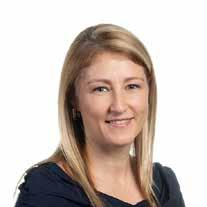



Professor Billy Boshoff is a professor in civil engineering, Faculty of Engineering, Built Environment and Information Technology. His field of research is construction materials, with a particular focus on how concrete relates to structural behaviour. He is a senior member of the International Union of Laboratories and Experts in Construction Materials, Systems and Structures (RILEM), twice president of the Concrete Society of Southern Africa and a registered professional engineer at the Engineering Council of Southern Africa.
He has published over 40 journal articles, delivered 65 peer-reviewed conference papers, and has organised two international conferences in his field. He was recently involved in the leadership of a RILEM technical committee on using superabsorbent polymers in concrete to prevent plastic shrinkage cracking.
His focus has been on fibre reinforced concrete, the time-dependant behaviour of concrete and fresh concrete behaviour. His more recent work is on “Internet of Concrete”, where concrete is monitored with special sensors, which can warn construction contractors in time about the issues and problems that occur during construction and recommend possible remedies that should be implemented immediately.
Prof Boshoff received a C1 rating from the NRF.

Professor Theo Bothma is professor emeritus in the Department of Information Science in the School of Information Technology (SIT), Faculty of Engineering, Built Environment and Information Technology. After his retirement in 2016, he was reappointed as contract professor until 30 June 2022. He was Head of Department (from October 1995) and Chairperson of SIT (from September 2008) until his retirement.
His research focuses on information organisation and retrieval in the e-environment (specifically e-lexicography and information literacy) and aspects of digital humanities. He is joint Editor-in-Chief of Libri: International Journal of Libraries and Information Studies. He is a member of the International Federation of Library Associations and Institutions standing committee for Library Theory and Research (chair 2017-2019). He was an expert advisor of the IFLA/FAIFE (Freedom of Access to Information and Freedom of Expression) committee (2010–2019), and editor / co-author of two FAIFE World Reports (2007 and 2010). He is a member of the Association for Information Science and Technology and the European and African Associations for Lexicography, Euralex and Afrilex.
In 2010, 2012 and 2014, he prepared three grant proposals resulting in grants from the Carnegie Corporation of New York (totalling US$5 million), for the development and presentation of two fully-funded programmes in IT for academic librarians from Carnegie-funded countries in Africa, culminating in a 2019 conference which he chaired.
Prof Bothma received a C1 rating from the NRF.

Professor Norman Casey is an emeritus professor in the Department of Animal Science. His research field centres on animal production physiology. He has led extensive research on water quality standards for livestock production and recently on the potential metabolic disruption of ingested bromide occurring naturally in groundwater.
Prof Casey has published papers on iodine as an alleviator of bromine toxicity in the thyroids, livers, and kidneys of broiler chickens, the prevalence of bromide in groundwater in selected regions in South Africa, bromide as a potential risk to livestock production in South Africa, and the survival and development of chicken embryos exposed to inorganic bromide. The latter revealed that the relative growth and development of the heart, liver, and brain could be influenced by varying concentrations of bromide.
Research on potential toxicities also included the effect of zinc nanoparticles on embryo and chicken growth in which abnormal differential development occurred. In the light of greenhouse gas emissions (GHGe) attributed to livestock, the quantification of GHGe by applying a ‘whole farm model’ could be applied across dairy farm management systems to quantify the carbon footprint of dairy production in South Africa. This would significantly contribute to South Africa’s obligated national inventory report on GHGe.
Prof Casey received a C2 rating from the NRF.



Professor Alice Chan is an associate professor of innovation management in the Department of Engineering and Technology Management at the Graduate School of Technology Management. She is currently the Chair of the Faculty of Engineering, Built Environment and Information Technology Research Ethics Committee.
Prof Chan’s research in technological innovation management focuses on networks. Through relationships or networks, actors inside and outside the organisation can learn collectively and gain capabilities to enhance individual, team and organisational innovation performance.
Her research interests include science parks, organisational networks, the National System of Innovation and multiple team memberships. From 2014 to 2018, she was part of an international research project Enabling Innovation and Productivity Growth in Low-Income Countries, which involved ten countries and was funded by the British Department for International Development. The South African study involves 500 manufacturing SMMEs at a national level. Due to her publications in the area of multiple team membership (MTM), she was invited as an international reviewer for a post-doctoral fellowship application in the research topic of multiple team membership (L’équipe du programme PRESTIGEco) financed by the EU Marie Curie Actions in 2018. Furthermore, in 2021 her co-authored research paper on MTM was published in International Project Management
Prof Chan received a C3 rating from the NRF.
Professor Christian Chimimba is professor and former Head of Department of Zoology and Entomology, Faculty of Natural and Agricultural Sciences, a research associate of the Mammal Research Institute, and a core team member of the Centre of Excellence for Invasion Biology. He is a past recipient of the National Science and Technology Forum Award for contributions to science, engineering, and technology.
Prof Chimimba is a registered professional natural scientist (Pr.Sci.Nat.) with the South African Council for Natural Scientific Professions and researches the biosystematics of African fauna using morphometric, DNA sequencing, ecological, epidemiological, and GIS techniques. He focuses on species of medical, veterinary, agricultural, economic, and nature conservation importance and is a co-reviser of the third edition of the authoritative Mammals of the Southern African Subregion published by Cambridge University Press. Prof Chimimba has served on the advisory boards of the Centre of Excellence at the Percy FitzPatrick Institute at the University of Cape Town, the Green Trust (Nedbank), and the Scientific Committee of the South African Biodiversity Institute. He served as an associate editor for the Journal of Mammalogy (USA), Biodiversity & Conservation (the Netherlands), and the South African Journal of Science.
Prof Chimimba received a C1 rating from the NRF.
Dr Kerry Chipp is an assistant professor in marketing at the School of Business, Maynooth University, Ireland. She received her PhD in Marketing at the Kungliga Teknisa Högenskolen (KTH) Royal Institute of Technology, Stockholm, Sweden.
Dr Chipp’s research interests lie in consumer behaviour and services marketing, focusing on value, empowerment, inequality, and building inclusive and sustainable environments. Her research centres on understanding consumer value, particularly latent value, acquisition value, and value in disposal for the circular economy.
Dr Chipp has taught at the University of the Witwatersrand, the Gordon Institute of Business Science (GIBS), and at Luleå tekniska universitet, Sweden. She heads a market research consultancy with clients across the spectrum, from private banking to the public sector. Dr Chipp has been heavily involved in media measurement in South Africa, working with the not-for-profit South African Advertising and Research Foundation and its successor, Market Research Foundation. She has also worked with the Coca-Cola System in Kenya, Tanzania, Namibia, and South Africa.
She has published in local and international journals, including the European Journal of Marketing and California Management Review
Dr Chipp received a C3 rating from the NRF.
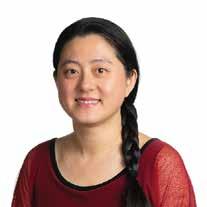



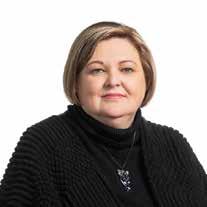
Dr Nicoleen Coetzee is a senior lecturer in the Department of Psychology, Faculty of Humanities. She has served as undergraduate coordinator from 2011 to 2012, programme manager of the MA Research Psychology Course from 2013 to 2016 and programme manager of the BSocSci (Honours) Psychology course since 2020.
Her research focuses primarily on the psycho-physiological wellbeing of adolescents and adults from a positive psychological perspective. This includes investigating the impact of biopsychosocial stress on wellbeing and establishing and identifying alternative modes of positive psychological interventions. Dr Coetzee teaches Psychological Research in Neuroscience and Positive Psychology and Statistics. She collaborated with the late Dr Charles Spielberger, Distinguished Research Professor of Psychology and Director of the Centre for Research in Behavioural Medicine and Health Psychology from 2003 to 2013 on applying the State-Trait Personality Inventory. It is an instrument he developed to assess wellbeing within the South African context. She is currently working with Prof Arnold Bakker of the Erasmus University, Rotterdam, to expand the Job-DemandResources Model that is used internationally to study burnout.
Apart from being an established researcher, she is also known for her contributions as a supervisor. She has delivered more than 25 postgraduate students since 2008.
Dr Coetzee received a C3 rating from the NRF.


Professor Stephan de Beer is Director of the Centre for Faith and Community and associate professor in practical theology, Faculty of Theology and Religion.
His broad research focus is on faith in the (African) city. Specific subthemes include urban vulnerability and inclusion, urban socio-spatial justice, pedagogies for urban transformation, community development, pathways out of homelessness, and faith-based responses to housing and human settlements. He is particularly interested in churches, faith communities, and social movements addressing and overcoming urban vulnerability. In the past three years, Prof De Beer secured research and project grants from, among others, the National Research Foundation, the Nagel Institute for World Christianity, Misereor, and Comic Relief. He contributed to the drafting of a street homelessness policy and strategy for the City of Tshwane and participated in provincial and national policy conversations on street homelessness and social housing.
Prof De Beer received a C1 rating from the NRF.
Professor Nico de Bruyn is an associate professor in the Department of Zoology and Entomology at the University of Pretoria and a research associate of the University’s Mammal Research Institute. He is also the principal investigator for the Marion Island Marine Mammal Programme.
His research focuses mainly on the population ecology of large aquatic and terrestrial mammals, with a specific interest in how individual heterogeneity relates to population processes in a changing environment. Prof De Bruyn has a keen interest in innovations in photogrammetry, as directed to the measurement of animal morphometrics and body size and has also built up a parallel research focus in zoological photogrammetry.
He is an associate editor for the journals Mammal Review and Ecology Letters, is a regular reviewer for, and has published more than 110 articles in international journals such as Nature and Science. He has spent two overwintering expedition years as a biologist on subantarctic Marion Island and accompanied relief expeditions to Gough Island as a member of South African teams. Prof De Bruyn was also invited to join respective Norwegian and German summer expedition teams to the remote Bouvet and King George Islands (maritime Antarctic). He is a member of various scientific and technical advisory bodies. He has kept the now 40-year old, uninterrupted Marion Island Marine Mammal Programme going for the past decade.
Prof De Bruyn received a C1 rating from the NRF.



Professor Henrietta de Kock is a professor of sensory food science in the Department of Consumer and Food Sciences. She has served as chair of the Africa Network for Sensory Evaluation Research (ANSWER) since 2019, the Vice-President of the South African Association for Food Science and Technology (SAAFoST) between 2019 and 2021, and as research chair of the European Sensory Network from 2012 to 2018.
She does research to optimise the sensory properties of foods that contribute to the nutrition status and well-being of consumers in sub-Saharan Africa. This includes gaining an understanding of the factors that impact consumers’ food choices by developing and applying suitable measurement instruments, food product development to meet the demands of a growing, more urbanised African population, and the exploration of Africa’s bio-diverse food sources to improve the nutritional value, appeal, and taste of the products.
Prof De Kock is an editorial board member for the Journal of Food Science. She is currently a collaborator on various international projects, including the European Commission Horizon 2020, USAID Feed the Future, Rockefeller Foundation, and the long-term Europe-Africa Research and Innovation Partnership for Food and Nutrition Security and Sustainable Agriculture (FNSSA EU-LEAP-AGRI).
Prof De Kock received a C1 rating from the NRF.
Professor Pieter de Villiers is an associate professor in the Department of Electrical, Electronic and Computer Engineering at the University of Pretoria. He obtained his bachelor’s and master’s engineering degrees at the University of Pretoria, and his PhD degree at the University of Cambridge. He is the head of the Signal Processing and Telecommunications group in the department and co-chair of the MultiChoice Chair of Machine Learning.
He is also an elected member of the International Society of Information Fusion (ISIF) Board of Directors. He contributes to an official ISIF working group on Evaluation Techniques for Uncertainty Representation and Reasoning (ETURWG). Prof De Villiers acted as a general co-chair of the 23rd International Conference on Information Fusion (virtual) in 2020 and will again act as general co-chair of the 24th International Conference on Information Fusion, held for the first time on African soil in 2021. He has acted as an associate editor for the Journal of Advances in Information Fusion, and is currently an associate editor of the Frontiers Signal Processing Journal
Prof De Villiers researches sensor, data and information fusion, as well as machine learning. Applications of both information fusion and machine learning include defence and security (radar target tracking), video streaming technologies, genetic and medical applications, machine diagnostics and prognostics, and some financial applications.
Prof De Villiers received a C1 rating from the NRF.
Dr Alta de Waal is a data science researcher trained in both mathematical statistics and engineering science. She has 20 years of experience designing, developing, and implementing different components in the data science value chain. The application fields range from defence decision support, human language technologies, wildlife security to transportation and telematics.
Her current research focuses on developing explainable AI methods, which is crucial to building trust in these systems. Furthermore, she is also concerned with developing latent variable models for extensive high-dimensional unstructured data and Bayesian networks. Dr De Waal is the Computational Statistics Research Group representative in the Centre for Artificial Intelligence (CAIR). The CAIR is a programme of the Department of Science and Innovation that is hosted and managed by the Council for Scientific and Industrial Research. CAIR was established to conduct foundational, directed and applied research into various aspects of Artificial Intelligence. Dr De Waal is a general co-chair for the International Conference on Information Fusion 2020 and 2021, which are hosted in South Africa. She is also the treasurer for SACAIR (Southern African Conference for Artificial Intelligence Research) — an annual multidisciplinary conference on AI hosted in South Africa. She also serves on the Board of Directors of the International Society of Information Fusion.
Dr De Waal received a C2 rating from the NRF.

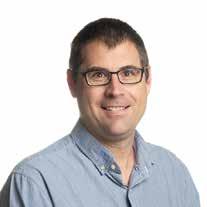


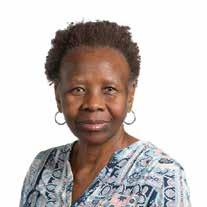
Professor Mmantsae Moche Diale is a full professor of physics and NRF SARChI Chair in Clean and Green Energy, Department of Physics, Faculty of Natural and Agricultural Sciences. She is a device physicist with vast experience in devices fabrication and evaluation, defects engineering and materials innovation. Her focus is on solar cells, ultraviolet detectors and photoelectrochemical and metal oxide semiconductor devices. She is using perovskites and hematite materials in solar energy collection, conversion and storage.
Prof Diale is keen on providing clean and green energy, also reducing the carbon footprint and the consequences of climate change. In 2018, Prof Diale received the National Science Technology Forum award on engineering capacity building for her work with teaching and training students, women in physics and advancing the scholarship of black South African students who are victims of past marginalisation. Her work on organic/semiconductor interfaces is also done via in-situ and operando at the synchrotrons and neutron radiation experiments. Furthermore, Prof Diale also works with metal nanostructures for plasmonic effects in different polymer solar cells to improve light harvesting and efficiency. Prof Diale currently serves as an expert and leader in several national and international committees, boards and initiatives for renewable energy solutions and related matters in climate change. She also serves as a board member of the International Union of Pure and Applied Physics’ Commission for Development.
Prof Diale received a C2 rating from the NRF.

Professor Alet Erasmus has been a research associate at the Gordon Institute of Business Science since 2018. She retired as head of the Department of Consumer Science, Faculty of Natural and Agricultural Sciences, at the University of Pretoria in 2016, with an extended appointment as professor emeritus, until 2018.
She has published 67 articles in accredited, peer-reviewed journals during her career, of which 27 were published during the past ten years. She has supervised 67 postgraduate students and has made research contributions at 34 international conferences during this time. She serves on the editorial board of the International Journal of Consumer Studies, as reviewer for several top international journals,such as the Journal of Retailing and Consumer Services. Her research interests include topics related to consumer behaviour and marketing, focusing on complex consumer decision-making and issues concerning informed, responsible consumer decision-making that involves consumer socialisation, and consumer satisfaction. In 2018, the first professional chef in the country with a PhD, completed his studies under her supervision, using Rasch modelling to conclude a definition and measuring instrument for food literacy in South Africa. She is the co-author and editor of Consumer Behaviour, South African Psychology and Marketing Applications, a prescribed textbook for tertiary institutions and has contributed several book chapters during her career.
Prof Erasmus received a C2 rating from the NRF.

Professor Eric Etter is a veterinarian epidemiologist working for the French Agricultural Research Centre for International Development (CIRAD). Currently based in Guadeloupe in the Caribbean, he is the secretary of the Caribbean Animal Health Network (CaribVET). Prof Etter was previously based in southern Africa: four years in Zimbabwe and six years in South Africa at the University of Pretoria’s Faculty of Veterinary Sciences, where he is an extraordinary professor in the Department of Production Animal Studies (DPAS).
Throughout his career, his research focused on different diseases, including vector-borne diseases as well as zoonotic diseases and diseases that have a significant economic impact on farmers and countries due to the ban on exportation. Recently he has also focused on antimicrobial resistance in different value chains. He assesses methods to determine the risk factors to propose the best and most cost-effective strategies to control these diseases. Prof Etter initiated the Community of Practice on Sanitary and Phytosanitary Risk Assessment held by Prof Abolnik in the DPAS that Dr John Grewar currently coordinates. Prof Etter is also co-principal investigator of the regional project “Unravelling the effect of contact networks and socio-economic factors in the emergence of infectious diseases at the wild-domestic interface”, mainly targeting African swine fever in South Africa, Mozambique, and Madagascar. This project is supported by The Ecology and Evolution of Infectious Diseases Program, grant no. 2019-67015-28981 from the USDA National Institute of Food and Agriculture.
Prof Etter received a C2 rating from the NRF.



Dr Sunet Eybers is a senior lecturer at the Department of Informatics, Faculty of Engineering, Built Environment and Information Technology.
In 2016 Dr Eybers fulfilled a lifelong dream when she exchanged her career of 15 years as an industry practitioner for that of an academic. After a mere five years into her ‘second’ career, being recognised as a researcher is indeed an achievement of note.
Her research generally focuses on applied data science. She takes an interdisciplinary stance when applying qualitative and quantitative approaches to study the following: data science for social good; data science implementation; applied data science subdisciplines, and teaching and learning.
She investigates fields that include business management (project management and organisational strategy), social media, applied data science, and pedagogy.
She is actively involved in all aspects of data science information systems and applications; organisational strategy; social media; online learning/e-learning; data/learning analytics, and pedagogy in higher education
Dr Eybers received a C3 rating from the NRF.
Professor Ute Feucht is an associate professor in the Department of Paediatrics, Faculty of Health Sciences. She is also the director of the University of Pretoria’s Research Centre for Maternal, Fetal, Newborn and Child Health Care Strategies and the Maternal and the Infant Health Care Strategies Unit of the South African Medical Research Council (SAMRC). Her research addresses broad questions of child health, focusing on paediatric HIV treatment, care and prevention, and childhood nutrition and growth and improving childhood morbidity and mortality. She also develops data systems to improve clinical care and monitoring of health outcomes. Her work focuses strongly on the ‘survive, thrive, transform’ agenda, with the ultimate goal to improve the health of children and their families within the communities in which she works.
As part of her joint appointment as paediatrician in the Tshwane District Health Services team, she received the following service excellence awards of the Gauteng Department of Health: Gauteng Province Khanyisa Service Excellence Awards, 2017: trophy in the special awards category for the Road-to-Health Booklet Unique Identifier to trace HIV-infected children at district level; Tshwanelo Awards, Tshwane District Health Services: chief directors’ award and trophy for contributing towards improved in-service delivery — Tshwane District Specialist Team, 2016.
Prof Feucht received a C2 rating from the NRF.
Dr Salomé Geertsema is a senior lecturer, registered dyslexia specialist, and programme coordinator for Speech-Language Pathology in the Department of Speech-Language Pathology and Audiology, Faculty of Humanities. She is also the head of the Specific Learning Disorder Clinic in the Department. Currently, she supervises six master’s and three PhD candidates. Her main research interests lie in second language acquisition, literacy, developmental dyslexia, and speech sound disorders.
Dr Geertsema is a social media liaison officer for the Stark-Griffin Dyslexia Academy, its affiliated non-profit organisation, The Red Apple Dyslexia Association, and a board member of the Gauteng-North branch of the Literacy Association of South Africa. Over the past three years, two of her postgraduate students received their degrees cum laude. Her 2020 undergraduate research group was awarded the AB Clemons Prize for the highest marks in a research project. Apart from her 17 accredited publications – six of which are first author – she visited the Pedagogical University of Krákow in Poland to present on literacy acquisition in multilingual learners. She is presently involved in an international project alongside the World Literacy Foundation, working with underserved primary schools to enhance literacy through technology.
Dr Geertsema received a C3 rating from the NRF.






Professor Aurona Gerber is an associate professor in the Department of Informatics and Information Systems, in the Faculty of Engineering, Built Environment and Information Technology at the University of Pretoria. She is the chairperson of the Centre for AI (CAIR) Research Group in AI for Development and Innovation. She has published more than 70 accredited publications with co-authors in the key areas of her research. This includes various aspects of information systems such as conceptual modelling, computational ontologies, enterprise architecture, applied AI and data science within IS, as well as design science research. She is the current president of the Southern African Institute for Computer Scientists and Information Technologists, as well as treasurer of the Association of Information Systems (AIS) SIGODIS (Intelligent IS Systems) Special Interest Groups.
Prof Gerber received a C1 rating from the NRF.
Professor Stephan Geyer is an associate professor in the Department of Social Work and Criminology, Faculty of Humanities. He initially worked as a social worker at Child Welfare South Africa and the Department of Social Development. He joined the University of Pretoria in January 2007 as a lecturer.
He was the programme coordinator for the B Social Work degree (2012-2018) and the deputy chair (2016-2018) of the Faculty of Humanities’ teaching and learning committee. He is currently the coordinator of the research information management system for the Faculty of Humanities. Prof Geyer teaches modules in addiction, gerontology, and research methodology. As research supervisor, he guides both master’s and PhD candidates in research focusing on addiction, social gerontology and HIV social interventions. As an applied researcher, his research focuses primarily on addiction (i.e. drug policy analysis, substance use disorders, and problematic internet use) and secondary social gerontology (e.g. gerontological social work training and the resilience of homeless older persons).
He is a member of the South African Academy for Science and Arts. In 2019, he was the second runner-up for the Humanities Teaching Excellence Award, Faculty of Humanities.
Prof Geyer received a C2 rating from the NRF.
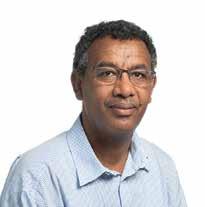
Professor Abubeker Hassen is an associate professor in ruminant nutrition and pasture science in the Department of Animal Science, Faculty of Natural and Agricultural Sciences. He researches climate-smart livestock production. His research interests include identifying climate-smart forage species to develop climate innovative feeding systems suitable for the mixed crop-livestock system in Africa and the manipulation of diets using new plant materials or bioactive compounds as an additive to modulate rumen fermentation and reduce enteric methane emission. Prof Hassen uses biophysical models to test interactions at the soil-water-plant-animal interface and identify suitable adaptation and mitigation options for the different production systems in the sub-Saharan Africa region.
He has successfully mentored more than 20 master’s and 12 doctoral students and published more than 82 papers in local and international peer-reviewed journals. Prof Hassen is currently an associate editor of the African Journal of Range and Forage Science, a member of the topic board editors for animals and a guest editor for Frontiers in Animal Science. He was a co-recipient of Étoiles de l’Europe, the French Ministry of Higher Education research and innovation award for project coordinators, partners, stakeholders, and members of the advisory board. In June 2021, he also received a trophy from the Department of Animal Production and Health of the University of Oye Ekiti in Nigeria, recognising his exemplary mentorship, knowledge advancement, and the success of the Climate-Smart Livestock Production in Africa Conference 2021.
Prof Hassen received a C2 rating from NRF.



Dr Natalie Haussmann is a senior lecturer in the Department of Geography, Geoinformatics and Meteorology, Faculty of Natural and Agricultural Sciences.
She is an ecologist with a specific interest in the interactions between ecology and geomorphology, also often referred to as biogeomorphology. She mainly focuses on both anthropogenic and natural ecological disturbance in her research. As such, she supervises student projects focusing on the effect of disturbances (road construction, burrowing, plant invasion) on species richness and the composition of plants and animals. Her research interests have evolved over the years into two main streams of interest within this overarching umbrella of ecological disturbance. Her main research interest is, however, on burrowing mammals and their ecological impact.
She has recently expanded her research to include burrowing within an agricultural context. This has broadened the scope and applicability of her research and facilitated projects both within the natural sciences and humanities, and engagement with the farming community in South Africa.
Dr Haussmann received a C2 rating from the NRF.
Professor Marlene Holmner holds a DPhil in information science from the University of Pretoria and is an associate professor in the Department of Information Science. Her research interests lie in information ethics, indigenous knowledge, information and communications technology (ICT) for development, information and knowledge society, institutional repositories, digitisation, and curriculum development.
Her work has been published in various academic journals, including the South African Journal of Libraries and Information Science and Mousaion. She has presented various papers and led panel discussions at national and international conferences such as UNISA’s Library and Information Science South Africa (ProLISSA) conference, Standing Conference of Eastern, Central and Southern African Library and Information Associations, pre-Educational Collaborative for International Schools and the Americas Conference on Information Systems (AMCIS) Global Development (SIG GlobDev) workshops. She has also been the programme chair and co-chair at SIG GlobDev workshops and mini-tracks, and has been on the programme committee for various international conferences such as the AMCIS, the International Conference on Mobile Business and the International Conference on Communication in Management, Education and Play. Prof Holmner is on the editorial board of the South African Journal for Information Studies (Mousaion), International Journal of Library and Information Science and The Journal of Information Technology for Development She teaches courses related to these fields at undergraduate and postgraduate levels and supervises several master’s and doctoral students.
Prof Holmner received a C2 rating from the NRF.
Professor Brett Hurley is an associate professor in the Department of Zoology and Entomology, Faculty of Natural and Agricultural Sciences, and a research leader in the Forestry and Agricultural Biotechnology Institute.
His broad research focus is the study of insect pests of forest trees to develop knowledge-based management strategies. Much of his research examines the use of biological control as a management strategy. His research also incorporates various other fields relevant to the understanding and management of forest insect pests, such as host resistance, insect-microbial interactions, genetic diversity and introduction history, risk assessment and pathway management. The majority of his projects are within the Tree Protection Cooperative Programme and the Centre of Excellence in Plant Health Biotechnology, where he focuses on insect pests of forest trees. He is also involved in projects on insect pests of crops such as macadamia and maize.
Prof Hurley is the current coordinator of the International Union of Forest Research Organizations (IUFRO) Working Party 7.03.13 Biological control of forest insect pests and pathogens, and the coordinator of the Forest Invasive Species Network for Africa, one of the regional invasive species networks initiated by the Food and Agricultural Organization of the United Nations.
Prof Hurley received a C1 rating from the NRF.
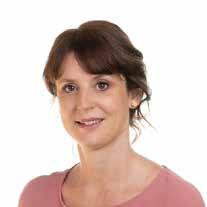
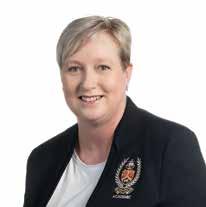
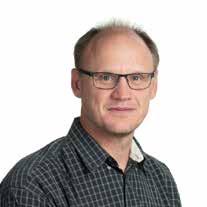


Dr Ensa Johnson is a senior lecturer at the Centre for Augmentative and Alternative Communication at the University of Pretoria.
Since the completion of her PhD in 2015, her research focuses on implementing augmentative and alternative communication strategies in educational, hospital and court settings.
Dr Johnson received the NRF/Stint International research collaboration grant in 2019 and two South Africa-Sweden University Forum grants (2019 and 2020) to research communication support for vulnerable children with long-term illnesses.
From this research, an m-health tool, the PicPecc application, has been developed to assist children with cancer and long-term illness to communicate their symptoms to healthcare professionals. The app has been translated into seven African languages to accommodate the multilingual context of South Africa.
Dr Johnson received a C2-rating from the NRF.

Dr Rodwell Kufakunesu is a senior lecturer in the Department of Mathematics and Applied Mathematics, Faculty of Natural and Agricultural Sciences. His research is focused on the mathematics of finance and financial engineering. Mathematics of finance is one of the department’s strategic areas of academic research, while financial engineering focuses on the profession. This structure is unique to the Department of Mathematics at UP.
Dr Kufakunesu is the programme coordinator of the honours course in the mathematics of finance and financial engineering and is involved in the supervision of research projects up to PhD level. His research topics are the optimal investment in equity, insurance, and derivatives pricing. He is one of the principal investigators and an intellectual leader in a research group funded by the ABSA Chair of the Actuarial Department. He has recently published in high impact quality peer-reviewed journals such as Communication in Statistics: Theory and Methods, and Optimization.
He has participated in national and international conferences, workshops, and seminars in mathematics of finance and acted as a guest speaker at the 12th International Workshop on Stochastic Models and Control at the Brandenburg University of Technology in Cottbus, Berlin 2019.
Dr Kufakunesu received a C2 rating from the NRF.

Professor Marilé Landman is an associate professor in the Department of Chemistry, Faculty of Natural and Agricultural Sciences.
Her research focuses on synthetic organometallic chemistry and, more specifically, on the study of Fischer carbene and N-heterocyclic carbene complexes of transition metals. She complements her experimental work, including work on the catalytic, electrochemical and structural properties of the novel carbene complexes, with chemical modelling studies to explain and verify experimental results.
Prof Landman received a C2 rating from the NRF.



Professor Henrietta Langmi is an associate professor in the Department of Chemistry, Faculty of Natural and Agricultural Sciences. Her research interests span the fields of inorganic chemistry, materials science and sustainable energy. Her overall aim is to develop novel/advanced materials with potentially useful properties, especially for sustainable energy applications. A key focus is on the synthesis, modification and characterisation of inorganic and inorganic-organic hybrid materials, primarily porous materials such as metal-organic frameworks, zeolites and carbon materials.
Her research explores the nano space and chemical composition of these materials and looks for effective strategies and sustainable ways of producing the materials. The targeted applications are in gas storage (hydrogen and methane), gas separation, carbon dioxide capture and utilisation, as hosts in the fabrication of advanced nano- and composite materials, and solid-state catalysts for energy-related applications. Other hydrogen storage technologies are also of interest. Prof Langmi’s most notably recent awards include the 2018 International Journal of Hydrogen Energy David Sanborn Scott Award for co-authoring the most cited paper of 2017 in the Hydrogen Storage & Distribution category, and the 2016 South African Women in Science Award — Distinguished Young Woman Scientist: Physical and Engineering Sciences category (2nd runner-up).
Prof Langmi received a C1 rating from the NRF.
Dr Mia le Roux is a senior lecturer in the Department of Speech-Language Pathology and Audiology, Faculty of Humanities at the University of Pretoria.
Her research areas are linguistics, phonetics, language acquisition, second language learning and teaching, and literacy acquisition. She received funding from the Suid-Afrikaanse Akademie vir Wetenskap en Kuns for a research project on the acquisition of Afrikaans phonemes in 2019. One of her PhD students, who graduated in April 2021, received a Swedish Foundation for International Cooperation in Research and Higher Education (STINT) initiation grant and a Thutuka research grant for her thesis, while a current PhD student received the Shuttleworth grant in 2019. Two of her postgraduate students graduated cum laude in the past three years, and her 2018 and 2020 final year students received the AB Clemons Prize for the highest marks in a research project. Dr Le Roux is currently supervising six master’s and three PhD candidates. She published numerous articles in accredited journals such as the Australian Journal of Language and Literacy and has presented and co-presented research papers at various international conferences, most recently in 2019 in Krakow, Poland, at the 2nd International Conference on Child Foreign/Second Language Learning Facing heterogeneity in the young learner classroom. She is project leader in a research and community outreach project in collaboration with the World Literacy Foundation at a rural primary school in Gauteng. She is a board member of the Literacy Association of South Africa, a member of the World Literacy Foundation, and various academic associations.
Dr Le Roux received a C3 rating from the NRF.
Dr Patricia Lutu is a senior lecturer in the Department of Computer Science, Faculty of Engineering Built Environment and Information Technology. She has been lecturing in this department since 2010.
Dr Lutu’s general field of research is data mining. Data mining involves the creation of predictive and descriptive models using computational and statistical techniques. Over the past 15 years, she has conducted research in the following areas of data mining: classification, feature selection for predictive data mining, mining of social media data, data stream mining of big data, and recommender systems. Over the past four years (2018 to 2021), Dr Lutu has acted as a member of technical program committees for four international conferences. These are the Southern African Conference for Artificial Intelligence Research (SACAIR) 2020 and SACAIR 2021, the International Conference on Advances in Big Data, Computing and Data Communication Systems (icABCD) 2018 in Durban, and the International Conference on Intelligent and Innovative Computing Applications (ICONIC MAURICON) 2018 in Mauritius. In the past three years, Dr Lutu has attended three international conferences, supervised seven honours students, and supervised two master’s students. One of the master’s students graduated in 2019.
Dr Lutu received a C3 rating from the NRF.





Professor Vinesh Maharaj is the Head of the Department of Chemistry and was appointed Deputy Dean: Research and Post Graduate Education, Faculty of Natural and Agricultural Sciences, in 2021. Prof Maharaj is a natural product chemist and is trained to discover new drug leads based on biodiversity samples. Consequently, he has taken the lead in bioprospecting in South Africa and internationally, where he focuses on biodiversity and traditional knowledge as a source of new pharmaceuticals. He is currently in charge of the biodiscovery group in the Department of Chemistry, whose main aim is to create a unique repository of natural products.
A collection comprising 10 000 plant samples forms the basis for the library, the first of its kind in Africa. The samples are converted into high throughput screening formats ready for biological testing for various diseases such as HIV, malaria, cancer, and COVID-19. He obtained funding from the Department of Science and Innovation (DSI) to establish this platform to make the resources available to the national system of innovation. The infrastructure includes high-end hyphenated analytical equipment for the chemical characterisation of the library.
Prof Maharaj is also a key team member of the DSI Bio-innovations Platform (African Traditional Medicines, Cannabis Research Consortium, and Cosmeceuticals) and contributes to the University of Pretoria’s component of this research.
Prof Maharaj received a C2 rating from the NRF.

Professor Janet Mans is an associate professor in the Department of Medical Virology, Faculty of Health Sciences. Her research interests include viral gastroenteritis and its primary causative agents, namely the caliciviruses, rotavirus, human adenovirus and human astrovirus. Her research is focused specifically on noroviruses, a major cause of gastroenteritis in all age groups with a significant global economic burden. She studies the molecular epidemiology, genetic diversity and host/virus interactions of noroviruses.
She combines enteric virus surveillance in clinical and environmental settings to elucidate their complex epidemiology. In 2020, the environmental surveillance was expanded to include SARS-CoV-2 in collaboration with Waterlab and the Water Research Commission. Currently, she is launching environmental surveillance for the hepatitis E virus in South Africa to gain more insight into this important cause of hepatitis. Prof Mans collaborates internationally with the Noronet surveillance network to monitor the emergence of novel norovirus variants or genotypes globally. She also contributes to the CDC-based Norosurv surveillance platform that is focused on paediatric norovirus surveillance. She serves on the editorial board of BMC Infectious Diseases.
Prof Mans received a C1 rating from the NRF.

Professor Tania Maree is an associate professor in the Department of Marketing Management, Faculty of Economic and Management Sciences. Her research interest is integrated marketing communications (IMC), with a particular focus on advertising and social media. She investigates IMC in terms of media users, as well as media sources. Prof Maree has contributed to the field of marketing communications in the form of several publications in local and international peer-reviewed journals (e.g. Journal of Promotion Management), and numerous conference papers in South Africa and internationally (e.g. Academy of Marketing Science World Marketing Congress). She also serves as a member of local and international marketing and/or management associations (EMAC, AMS), acts as a reviewer for accredited local and international academic journals (e.g. European Business Review), and as a co-author of consumer behaviour textbooks. Her work successfully adds a voice to the extant marketing communications literature on the African continent as well as globally. Prof Maree believes in the power of education to enrich and empower people on an intellectual and a psychological level. She favours a student-centred approach in teaching by creating learning experiences for students as they expand their knowledge, insight and skills.
Prof Maree received a C3 rating from the NRF.



Professor Gustav Muller is an associate professor in the Department of Private Law, Faculty of Law.
His primary research interest is the law of evictions, which lies at the intersection of property and housing law. Additionally, he is a scholar of property methodology and theory. The Supreme Court of Appeal and five different divisions of the High Court of South Africa have cited him. In 2019 the Society for Hugo de Groot awarded him the prize for the best maiden article in the Journal for Contemporary Roman-Dutch Law for his article entitled “To fell or not to fell: The impact of NEMBA on the rights and obligations of a usufructuary”. He is the editor of Silberberg and Schoeman’s The Law of Property 6th edition (LexisNexis, 2019) — a trusted general reference work on South African property law — and Transformative Property Law — Festschrift in honour of AJ van der Walt (Juta, 2018). He is the co-author of Property in Housing (Juta, 2021), the first scholarly work in South Africa to propose a comprehensive normative and substantive framework for the interpretation of access to adequate housing in the Constitution of the Constitution Republic of South Africa, 1996.
Prof Muller received a C2 rating from the NRF.
Professor Herman Myburgh is an associate professor in the Department of Electrical, Electronic and Computer Engineering. He is the head of the Advanced Sensor Networks research group and the director of the Centre for Connected Intelligence.
His research interests are wireless communications, wireless sensor networks, machine learning, signal processing and mobile health. He is also leading the development of automated agriculture technologies to help improve farming efficiency, focusing on the dairy farming industry. He teaches digital communications and data security to third- and final-year computer engineering students and supervises numerous master’s and PhD students. He is the co-founder of hearX Group (Pty) Ltd, a medical technology company, with the chief aim of making hearing healthcare accessible to people from all socio-economic backgrounds. He is the co-inventor of numerous mobile healthcare patents developed into commercial products and currently being used around the world.
Prof Myburgh received a C2 rating from the NRF.
Professor Mageshen Naidoo is an associate professor and coordinator of jazz studies in the School of Arts: Music, Faculty of Humanities.
Prof Naidoo is a jazz guitarist and composer whose music is recorded and performed locally and internationally. His research interests include jazz performance, improvisation, and composition and arranging.
He currently serves his second term as president of the South African Association for Jazz Education. Prof Naidoo serves on the editorial board of the accredited academic journal Muziki: Journal of Music Research in Africa
As a former Fulbright scholar, Prof Naidoo obtained his Doctor of Musical Arts degree in Performance from the University of Southern California, Los Angeles (USC). He also holds an MM degree in studio/jazz guitar performance from USC, an MMus degree in performance and jazz composition (cum laude), and a BMus degree in jazz studies from the University of Kwazulu-Natal. He has performed in the USA, the UK, Scotland, Germany, Sweden, Canada, Mexico, the Netherlands, Denmark, Seychelles, and South Africa. His extensive performance credits include Ladysmith Black Mambazo (South Africa) and African pop star Angelique Kidjo.
Prof Naidoo received a C2 rating from the NRF.


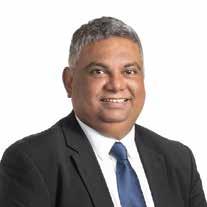


Professor Sanushka Naidoo is an associate professor and the Head of Department of Biochemistry, Genetics and Microbiology.
Prof Naidoo leads a programme on resilience in forest trees within the Department of Forestry and Agricultural Biotechnology Institute, where she studies the defence responses of forest tree species, eucalyptus and pine to pests and pathogens. She is also a team leader in the forest molecular genetics programme. Prof Naidoo is interested in the molecular mechanisms underlying resistance with the view to developing markers to enable the selection of more resilient trees or engineer trees with enhanced defence capacity. She uses association studies, transcriptomics, microscopy and genetic engineering approaches in clones and at the population level to dissect complex tree defence responses. As climate change also drives the outcome of tree-pathogen interactions, her recent research focus is on the combined effect of abiotic (drought/heat) and abiotic challenges on host defences.
Prof Naidoo was awarded the Next Einstein Forum (NEF) Fellowship 2017-2019 and is currently the chair of the NEF Community of Scientists. She is the current president of the South African Genetics Society, a position she has held since 2018.
Prof Naidoo received a C2 rating from the NRF.

Professor Alewyn Nel is a professor in Industrial Psychology and the Head of the Department of Human Resource Management and Co-Director of the College of Psychology. He currently serves as the Chairperson of the Research Ethics Committee in the Faculty of Economics and Management Sciences.
Prof Nel was trained in cross-cultural psychology methodologies during his PhD and applied this throughout his research career. His research focused on the cross-cultural implications for assessment and management, emphasising personality, social desirability, and identity. He used various qualitative and quantitative methodologies in his research.
He won the Best Senior Researcher in Management Sciences Award at the Faculty of Economics and Management Sciences in 2019. He currently serves as a national board member of the South African Journal of Industrial Psychology and is an associate editor of the South African Journal of Economics and Management Sciences. At present, he serves as the Chairperson for the Society of Industrial and Organisational Psychology HOD Forum, which includes Heads of Departments, chairs, and directors of academic industrial psychology departments across South Africa.
Prof Nel received a C2 rating from the NRF.

Dr Maitumeleng Nthontho is a senior lecturer and researcher in the Department of Education Management and Policy Studies, Faculty of Education. She is the South African project leader of the collaborative project between two South African universities (the University of Pretoria and the University of Venda) and two Swedish universities (the University of Gothenburg and Malmö University) (SASUF). She has completed research courses/programmes meant to equip emerging researchers with research and supervision skills. These include postdoctoral research fellowships, Strengthening Postgraduate Supervision and Tuks Young Research Leadership. Dr Nthontho has been appointed to serve as a mentor under the nGAP Mentorship Programme (New Generation of Academics Programme) in the office of the Vice-Principal: Academics. She has served as an external examiner for both master’s dissertations and doctoral theses at several universities and has acted as a reviewer for local and international journals such as the International Journal of Leadership in Education and the South African Journal of Education. She successfully completed the Associate Editor Mentorship Programme with the South African Journal of Science and serves as an editorial member for local and international journals. These include the Journal of Adult and Youth Education and the Journal of African Education, among others. Her research interests include education law, human rights in education, mentoring in education, school management, leadership and governance, and religious diversity.
Dr Nthontho received a C2 rating from the NRF.



Professor Siona O’Connell is an African Studies scholar at the School of the Arts, Faculty of Humanities. Her research focus falls within three areas: memory studies, creative studies, and restorative justice in postcolonial and post-apartheid South Africa. She is widely respected for her research on land restitution in South Africa and women in South Africa’s clothing and textile industry.
Her co-edited book, Hanging on a Wire, won the 2018 National Institute for the Humanities and Social Sciences (NIHSS) Humanities and Social Award for the best non-fiction edited volume, and her monograph on forced removals in Cape Town, An Impossible Return: Cape Town’s Forced Removals is widely recommended. She has curated numerous exhibitions and directed and produced eight film documentaries that emerge from her commitment to research that focuses on trauma, memory and belonging in post-apartheid South Africa. She uses the creative project to think about difficult questions of belonging, violence and redress, shifting frames from aesthetics to restorative justice.
Prof O’Connell was a Trilateral Reconnections Project Fellow (Brown University), is a Brown International Advanced Research Institute alumnus, and was the NEH Distinguished Visiting Professor of the Humanities at Colgate University in the USA in 2018 and 2019. She is the South African project leader for an international project on climate change, cultural heritage and resilience.
Prof O’Connell received a C2 rating from the NRF.
Dr Jonathan Okeke is a senior lecturer at the University of Pretoria and a senior research fellow at the Centre for Interdisciplinary and Intercultural Studies, Eberhard Karls University in Tubingen, Germany. His teaching and research interests cover African philosophy, logic, ethics, political philosophy and decoloniality.
He propounded the theory of conversational thinking and a system of logic called Ezumezu, which have been the themes of some international colloquia and round table discussions. He is the recipient of several research awards and has acted as an international guest speaker. Recently, he received the University of Pretoria’s Exceptional Young Researchers’ Award for 2021. He is the African Philosophy Area Editor of the Internet Encyclopaedia of Philosophy. Dr Okeke has mentored and continues to mentor many young African scholars. He is co-author of the recent book African Metaphysics, Epistemology and a New Logic: A Decolonial Approach to Philosophy (Palgrave 2021). Dr Okeke is working on a new manuscript titled The Structure of Conversational Thinking. He is also the principal investigator in the funded research projects ‘Decoloniality through Conversational Thinking’ and ‘Decolonial Methods in the Humanities’. Dr Okeke is a logician and social thinker and has published 53 articles, 34 chapters and 14 books.
Dr Okeke received a C1 rating from the NRF.


Professor Daniel Petzer was professor of marketing, director of research at the University of Pretoria’s Gordon Institute of Business Science, and ultimately deputy dean of the business school. He is currently the head of research at Henley Business School Africa. His research investigates consumer responses to organisations’ efforts to build, maintain and restore relationships with customers in a service context.
Prof Petzer has authored and co-authored several journal articles, most notably in the Journal of Services Marketing, Journal of Business & Industrial Marketing, The Service Industries Journal, European Business Review, International Journal of Bank Marketing, International Journal of Quality & Reliability Management, Journal of Internet Commerce and local journals such as the South African Journal of Business Management, Southern African Business Review, and the Retail and Marketing Review and Management Dynamics. He has contributed to textbooks and regularly presents papers at national and international conferences.
Prof Petzer is an associate editor for the European Business Review and an editorial board member of the Southern African Business Review. He has successfully supervised several MSc and PhD students in his field.
Prof Petzer received a C2 rating from the NRF.


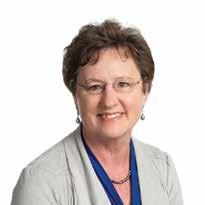
Professor Marietjie Potgieter is an emeritus professor in the Department of Chemistry and former Deputy Dean: Teaching and Learning, Faculty of Natural and Agricultural Sciences, from 2013 to 2020. The primary focus of her research is effective instruction and student success in tertiary science, which includes academic development programmes for students that do not meet entrance requirements for tertiary science. Recent research projects include investigations into effective learning strategies for tertiary science, student preferences and engagement patterns with face-to-face and virtual learning opportunities in blended learning environments and their relationship to performance, and hands-on experiments using low-cost equipment to address learning barriers that first-year students experience in spectroscopy. Prof Potgieter is the national representative for South Africa and was recently elected as the chair of the Committee of Chemistry Education of the International Union of Pure and Applied Chemistry, which is the leading international federation of member states that serves chemistry globally.
Prof Potgieter received a C1 rating from the NRF.

Professor Anastassios Pouris is the director of the Institute for Technological Innovation, Faculty of Engineering, Built Environment and Information Technology and currently serves in the Office of the Dean.
He has experience in international benchmarking, research evaluation, indicators and science, technology, and innovation policy issues. He has been the main contributor to establishing tax incentives for research and development and financial support for research equipment.
Prof Pouris has authored 107 publications indexed in the Web of Science. He is well-cited internationally and has an h-index of 17.
He serves on editorial boards of several international journals and was a member of the Ministerial Committee on Higher Education, Science, Technology, and Innovation Infrastructure Landscape. He has been a Fellow of Universities South Africa and an elected member of the Academy of Sciences of South Africa. He regularly assists the National Advisory Council on Innovation with investigations.
Prof Pouris received a C2 rating from the NRF.
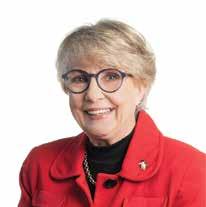
Professor Reineth Prinsloo is an associate professor in the Department of Social Work and Criminology, Faculty of Humanities. Her area of research is group work as a method of intervention in the field of social work. With the emphasis on decolonising and transformation, she focuses on the lack of published research on social work with groups in the South African context. Group work as an intervention method in South Africa focuses on growth and development through education, support, socialisation, and therapeutic input within a developmental welfare approach. An important focus of her research is group work to establish social enterprises for social and economic development. Other focus areas are the use of arts and crafts activities in group work and online group work in teaching and practice, while group work is also used to understand diversity for multicultural and social justice competence. In June 2018, she received the International Association for Social Work with Groups (IASWG) International Honoree Lifetime Award for her contribution in this field. In October 2018, she was elected as the Vice President of IASWG.
Prof Prinsloo received a C1 rating from the NRF.



Professor Gert Prinsloo is a professor in the Department of Ancient and Modern Languages and Cultures, Faculty of Humanities. His research focuses on contextual interpretations of ancient Near Eastern literature, notably the Psalter/Book of the Twelve Minor Prophets. Cultural semiotics insistence that textual interpretation encompasses deciphering a complex network of socially determined codes inform his research approach. He combines meticulous textual analyses (intratextuality) with an analysis of a text’s literary (intertextuality) and socio-historical (extratextuality) context. It allows for innovative applications of approaches from the humanities/social sciences, including critical spatiality, social scientific criticism, cross-cultural studies, and ecological systems theory. It provides insightful perspectives on the multi-faceted meaning(s) and application(s) of texts written in ‘dead languages’. He recently acted as co-editor of two books illustrating the value of combining meticulous textual analysis and contextual interpretation(s). Intertextuality illustrates that corpora in the Hebrew Bible, traditionally regarded as anthologies of disparate texts, can be read as meaningful literary units. Spatial readings allow for contextual interpretations taking ancient Near Eastern worldviews and spatial orientations seriously.
Prof Prinsloo received a C1 rating from the NRF.
Professor Abel Ramoelo is a director for the Centre of Environmental Studies and associate professor in the Department of Geography, Geoinformatics and Meteorology, Faculty of Natural and Agricultural Sciences.
Prof Ramoelo’s core expertise in remote sensing and environmental sciences focuses on mapping vegetation health assessment, species (including invasive), biochemistry and productivity and water quality and quantity. He uses passive or optical (hyperspectral and multispectral) and active remote sensing data at various scales for informing decisions about natural resource and environmental management (i.e. biodiversity conservation, land degradation, climate change impact, water resources), and food security. Currently, Prof Ramoelo is also involved in projects focusing on land cover and land use mapping and change detection in natural, agricultural and urban landscapes.
He is an associate editor for three journals: Journal of Applied Earth Observation and Geoinformatics, Frontiers in Remote Sensing: Multi- and Hyperspectral Imaging, and Editor-in-Chief for Koedoe: African Protected Area Conservation and Science.
Prof Ramoelo received a C2 rating from the NRF.
Dr Jean-Baptiste Ramond has been extraordinary lecturer in the Department of Biochemistry, Genetics and Microbiology, Faculty of Natural and Agricultural Sciences, since 2019. Dr Ramond has been affiliated as a research fellow of the Centre for Microbial Ecology and Genomics, University of Pretoria, since 2013. Here he developed his research on the microbiology and microbial ecology of extreme environments.
He mainly focuses on exploring the microbial ecology of southern African deserts and, in particular, on the majestic hyper-arid Namib Desert, in collaboration with Professor DA Cowan. Using a suite of meta-omics’ technologies, he deciphers how micro-organisms have adapted, at both individual and community levels, to (poly)extreme environmental conditions in open soils, and in the more protected, cryptic lithic (eg hypoliths) and plant-associated niches (eg rhizosheaths and rhizospheres). He has also developed a keen interest in biomolecular archaeology and palaeomicrobiology in collaboration with Dr RF Rifkin. Overall, this has led to his participation in over 50 research articles, reviews and book chapters to date.
Dr Ramond has been a visiting academic in the Faculty of Humanities and Social Sciences at Oxford Brookes University (UK) since 2018, and an assistant professor in the Department of Molecular Genetics and Microbiology at the Pontificia Universidad Católica de Chile (Santiago, Chile), since 2019.
Dr Ramond received a C2 rating from the NRF.





Professor Oleg Reva is a full professor in bioinformatics in the Centre for Bioinformatics and Computational Biology in the Department of Biochemistry, Genetics and Microbiology. Prof Reva’s research interests are in the development of new biostatistical algorithms and computer programs for academic studies, biotechnology and medicine, the development of new approaches and algorithms for genomics and epigenetics, next-generation sequencing, in silico comparison and ‘linguistic’ analysis of bacterial genomes for phylogenetic inferences and mobilomics. He is also interested in metagenomics and transcriptomics, computational drug design and molecular docking modelling, reconstruction of genome evolution and metabolic networks. He pays special attention to studies on the emergence and distribution of antibiotic resistance in pathogenic bacteria.
Postgraduate students supervised by Prof Reva at UP formed a school of experts in bioinformatics in South Africa. Prof Reva was one of the founders of the South African Society for Bioinformatics (SASBi). He was the SASBi Vice President from 2014 to 2016 and is currently the treasurer of the society. Prof Reva has established a strong and productive international collaboration network that includes researchers from Tanzania, Kenya, the United Kingdom, Germany, Ukraine, China, Russia and Kazakhstan. These collaborative studies resulted in 44 publications over the past five years. In total, he has produced more than a 100 papers and book chapters. His Scopus h-index is 26, and his Google Scholar h-index is 30.
Prof Reva received a C1 rating from the NRF.


Professor Darren Riley is an associate professor in the Department of Chemistry, Faculty of Natural and Agricultural Sciences. Prof Riley’s research includes the use of advanced chemical manufacturing technologies such as flow chemistry. This is used for developing improved process routes to critical pharmaceuticals with a drive to provide more economical, greener and safer means of manufacturing pharmaceuticals. His research focuses on facilitating the establishment of a regional pharmaceutical manufacturing sector, which aims to reduce cost and improve access to medicines across the southern African region. In addition, professor Riley is involved in medicinal chemistry, focusing on developing novel neuroprotective chemical entities to treat Alzheimer’s disease. Recently, he was awarded the Department of Science and Innovation, and the National Research Foundation’s respected high-end infrastructure grants, allowing the establishment of one of the largest flow chemistry research facilities globally.
Prof Riley received a C2 rating from the NRF.
Professor Mark Robertson is a professor in the Department of Zoology and Entomology, Faculty of Natural and Agricultural Sciences. He is an ecologist with interests in species distributions, biological invasions and ecological communities.
His work on species distributions investigates how distribution data from citizen science projects, such as atlas projects can be used to quantify animal and plant distributions. He uses species distribution modelling to investigate potential distributions of invasive species and species of conservation concern. His research on biological invasions includes the study of invasion pathways, the route by which species are introduced, e.g. through the exotic pet trade, and how these can be managed to reduce future invasions.
Prof Robertson investigates patterns and drivers of ant diversity from a long-term elevation gradient study in the Maloti-Drakensberg mountains. He has an interest in the roles that insects, particularly termites and ants, play in ecosystems. A current research project investigates the role of termites and ants in soil processes and ecosystem function in savannahs.
He served as an associate editor for the journal Diversity and Distributions from 2007 to 2019 and is a core team member of the Department of Science and Innovation-National Research Foundation’s Centre for Invasion Biology.
Prof Robertson received a C1 rating from the NRF.


Professor Bernardo Rodrigues is an associate professor of mathematics in the Department of Mathematics and Applied Mathematics, Faculty of Natural and Agricultural Sciences.
Prof Rodrigues’s primary research interests concern with the study of the mathematical theory of error correcting and error detecting codes from an algebraic perspective. His main interest is on the links between algebraic coding theory and the theory of finite groups with applications to modular representation theory of finite groups and combinatorial design theory. His secondary area of research contributes to a better understanding of the dynamics of epidemiological disease transmission, using classical methods of difference equations and networks in graph theory.
In collaboration with a team of colleagues of the University of Birmingham (United Kingdom), he was awarded a London Mathematical Society Mentoring African Research in Mathematics (MARM) Partnership grant (2017) to conduct joint research on problems related to the classification of axial algebras from sporadic simple groups and groups of 3-transpositions. Prof Rodrigues held several visiting research positions at universities in Europe, Australia, New Zealand, and the United States of America. The latter was a prestigious by-invitation-only research undertaking at the Isaac Newton Institute for Mathematical Sciences, Cambridge (March 2020), where he participated in a programme, ‘Groups, representations and applications: new perspectives’. He was a recipient of a number of prestigious awards, the most recent ones being a Fulbright Scholarship award (2017) and two Erasmus Mundus Scholarships (2016 and 2018).
Prof Rodrigues received a C1 rating from the NRF.
Dr Edward Snelling is a senior lecturer in the Department of Anatomy and Physiology, Faculty of Veterinary Science, and an honorary affiliate of the Centre for Veterinary Wildlife Studies
He is an experimental physiologist interested in the evolution of form and function among different groups of animals. His diverse interests have led him to devise novel methods, including flying insects in miniature bespoke flight simulators, swimming sharks in giant ocean-going ‘mega-flumes’ and running mammals on large treadmills. Among his recent achievements, he and his collaborators devised a method to calculate blood flow rates to the brain across three million years of human evolution, showing an increase in the brain’s size and relative perfusion. Seven of his research articles are placed in the top 5% of all research outputs scored by Altmetric, another was recently short-listed for the Journal of Experimental Biology Outstanding Paper Prize, and another was included in the Faculty of 1000 with the highest ranking of 3, placing it among the very best scientific articles in biology and medicine.
Dr Snelling received a C1 rating from the NRF.
Professor Catherine Sole is an associate professor in the Department of Zoology and Entomology, Faculty of Natural and Agricultural Sciences. Prof Sole heads up the Invertebrate Biosystematics and Conservation Group. Her research focuses on invertebrate biosystematics, conservation, and Southern African biogeography, specialising in dung beetles and lacewings. She provides a platform for students interested in molecular systematics and phylogeographic studies and, in so doing, aims to create an increased interest in and passion for invertebrates, systematics and, on a broad scale, the effects that past and present climatic and landscape changes have had on Southern Africa. She collaborates extensively with researchers from the United States of America, Asia and Europe, and has published over 50 papers and three book chapters in her field. Of the 30 postgraduate students she has supervised, 20 have completed their degrees. She continues to supervise a further ten, seven of whom are PhD students.
Prof Sole was recently appointed as an editor for the journals Scientific Reports and Frontiers in Insect Science. Prof Sole is the chair for ICE2008 and the vice-chair for the FBIP steering committee. She is also a founding member of the International Union for Conservation of Nature (IUCN) Conservation Genetics Specialist Group: African Node.
Prof Sole received a C2 rating from the NRF.

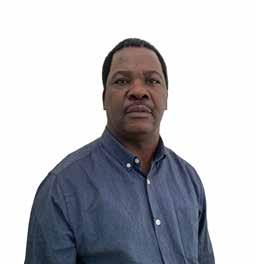




Dr Hanli Stapela is a senior lecturer and coordinator of the Classical Voice and Opera Studies programme in the School of the Arts: Music, Faculty of Humanities. She is also the coordinator of creative outputs for the Humanities. Her research builds on a long career as an international performing artist, and particularly an award-winning opera singer. As her research activities primarily result in creative outputs, they mainly fall within the gamut of performance research and practice-as-research, using hermeneutic, performance-led and performance-based methodologies. Her research focuses on three themes: Theatre as art song or art song as theatre; Vocal music through a chiaroscuro lens; and a long-term project aimed at recording Afrikaans art songs to create an archive to preserve this genre of music. The first set of recordings consisted of songs based on poems by AG Visser, and the second will be early songs from the pioneering setting of Winternag by JHG Bosman, which is widely viewed as the first Afrikaans art song. She recently led a Unicef-funded study titled Deliberate practice as a component of grit: raising awareness among undergraduate singing students during the COVID-19 pandemic lockdown.
Dr Stapela received a C2 rating from the NRF.

Professor Vanessa Steenkamp is the Deputy Dean: Teaching and Learning, Faculty of Health Sciences. She is an active member of various scientific organisations. She is the first female President of the South African Association of Basic and Clinical Pharmacology, President of the Federation of South African Society of Pathology, Vice-President of the Toxicology Society of South Africa, past and inaugural President of the African Federation of Clinical Chemistry, and the first executive member of the Education and Management Division of the International Federation of Clinical Chemistry (IFCC) from Africa.
Her research focuses on traditional herbal remedies and the development of drugs. She is the author of 180 scientific papers and six book chapters and is frequently invited to speak at conferences. In the past three years, she was a finalist in the National Science and Technology-South32 awards in the category: Research Capacity Development and the recipient of the South African Society for Basic and Clinical Pharmacology Educator Award.
She recently was elected chair of the assessment subcommittee of the Dirisana project and is a steering member of the Teaching and Learning Subcommittee of the South African Committee of Medical Deans for undergraduate studies. She serves as reviewer for numerous international peer-reviewed journals and is on the editorial board of seven journals. She has successfully supervised 65 postgraduate students to graduation.
Prof Steenkamp received a C2 rating from the NRF.

Professor Martin Steyn is an associate professor in the Department of Plant and Soil Sciences at the University of Pretoria. His research focus is on the agronomy and water requirements of field crops and medicinal plants. He has been involved in research on potatoes for the past 34 years. His current research focus is on improving effective irrigation water management, potato production in a changing climate, and the development of more sustainable crop production practices. Prof Steyn collaborates with several national and international scientists, research organisations and companies. He has presented numerous papers at national and international conferences and trained potato agronomists, field staff and growers in sustainable irrigation practices in South Africa, Australia, Egypt, Russia, India, various African countries and the Middle East.
Prof Steyn serves on the council of the South African Society of Crop Production and was recently appointed as subject editor (agronomy) of the journal Potato Research Over the past 20 years, he supervised and co-supervised 62 postgraduate students who have successfully completed their master’s and doctoral degrees. Currently, he supervises and co-supervises a further 15 postgraduate students. He has published 72 scientific papers in peer-reviewed journals and more than 60 semi-scientific and popular articles.
Prof Steyn received a C1 rating from the NRF.



Professor Maniraj Sukdaven is an associate professor in the Department of Religion Studies, Faculty of Theology and Religion. He is also an adjunct professor in the Faculty of Knowledge and Islamic Thought at the University of Tehran.
His research is on inter-religious dialogue and focuses on religion in the years 1000 BCE–800 CE in the geographic regions of India, Persia, Syria, Greece, and Egypt. Four career highlights include his historic appointment as the first Christian in the position of adjunct professor in the Faculty of Knowledge and Islamic Thought (University of Tehran), an invitation to present a paper at the United Nations General Assembly Conference in 2019 on “The role of the culture of peace in social cohesion and inclusiveness”, an invitation by the Journalist and Writer’s Foundation in October 2019 to participate in a roundtable discussion “Rule of Law and Democracy: Addressing the Gap Between Policies and Practices”, and, securing funding of approximately R9m over five years to establish the Oxford Centre for Public Life and Security in Africa in the Department of Religion Studies, University of Pretoria.
Prof Sukdaven received a C2 rating from the NRF.
Dr Nicolette Taylor is a senior lecturer in the Department of Plant and Soil Sciences, Faculty of Natural and Agricultural Sciences. Dr Taylor’s research focuses on the measurement and modelling of fruit tree water use. This has included several, from pecans and macadamias to apples, citrus and avocados. The research group has managed to collect comprehensive water use data sets for some of these crops on which there has been minimal information available in the past. This information is required by both growers and government to improve water management and water use efficiency in this sector of agriculture that makes an important contribution to the agricultural GDP. The group employs the latest techniques to quantify water use and the drivers thereof required to parameterise and validate water use models. This is required to allow the extrapolation of measured data to a wide range of orchards in different climatic regions. In order to improve spatial management of water, the team is currently investigating remote sensing options to determine tree size and possible stress. Research results have been presented at international and national conferences, which has included the local Combined Congress and various international ISHS symposia. Regular feedback is also provided to a number of grower associations within South Africa.
Dr Taylor received a C2 rating from the NRF.
Professor Peter Thompson is a veterinarian and a professor of veterinary epidemiology in the Department of Production Animal Studies, Faculty of Veterinary Science. He obtained specialist recognition in bovine medicine in 1999 and epidemiology in 2015. He is a past president of the Southern African Society for Veterinary Epidemiology and Preventive Medicine and past chairperson of the International Society for Veterinary Epidemiology and Economics.
Prof Thompson teaches veterinary epidemiology and researches a broad range of topics related to infectious diseases and their effect on production animal and companion animal health. His particular field of interest is the epidemiology of zoonotic infectious diseases at wildlife-livestock-human interfaces, focusing on mosquito-borne viral diseases of international importance such as Rift Valley fever, including dynamics of infection in animals, ecology of disease vectors and assessment of animal and public health impacts. He has several ongoing multidisciplinary collaborations that are investigating these diseases within a One Health context.
Prof Thompson received a C1 rating from the NRF.

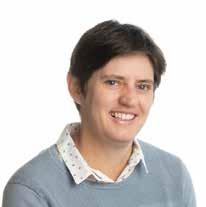



Dr Nils Timm is a lecturer in the Department of Computer Science, Faculty of Engineering, Built Environment and Information Technology.
His research focuses on the development of model checking techniques for concurrent software systems and multi-agent systems. Model checking is a technique for verifying whether a system satisfies correctness properties such as safety and liveness. Due to the high complexity of the systems under consideration, efficiency is a major challenge in model checking. Dr Timm also investigates the combination of model checking with abstraction techniques that transform the systems into size-reduced state-space models. The abstraction involves a complexity reduction and consequently an improvement of the verification performance.
Dr Timm is active in the model checking research community as a programme committee member of several international conferences and as the co-organiser of the International Workshop on Verification and Strategy Synthesis in Multi-Agent Systems 2020. He is the local principal investigator of a bilateral research project with the Stockholm University, Sweden, on the development of verification techniques for multi-agent systems. In 2020 he received the Departmental Teaching and Learning Award.
Dr Timm received a C2 rating from the NRF.
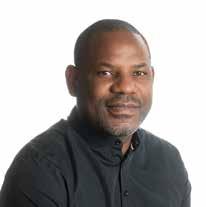
Dr Emmanuel Tshikalange is a senior lecturer in the Department of Plant and Soil Sciences, Faculty of Natural and Agricultural Sciences. His current areas of interest include investigating selected ethnobotanical medicinal plants used traditionally to treat and manage sexually transmitted diseases. Several medicinal plants that he studied have shown potential as antimicrobial, anti-inflammatory and anti-HIV agents.
To date, Dr Tshikalange has supervised 11 honours, 16 master’s and four doctoral students. His work yielded 24 articles in peer-reviewed journals such as South African Journal of Botany and Journal of Ethnopharmacology, seven book chapters and more than 25 papers and presentations at national and international conferences. Over the past five years, Dr Tshikalange received substantial Indigenous Knowledge System grant funding for his projects. He has examined dissertations from various universities and refereed articles in reputable international journals .
He is currently an associate editor for BMC complementary & Alternative Medicine and Investigational Medicinal Chemistry and Pharmacology.
Dr Tshikalange received a C2 rating from the NRF.

Dr Clinton van der Merwe is a senior lecturer of geography education in the Department of Humanities Education, Faculty of Education. He has a PhD in heritage tourism at the University of Johannesburg and is interested in teaching geography, sustainable development, and cultural and heritage tourism. Before joining UP, he was the Head of Humanities, acting Head of Academics, and a senior geography teacher at the Oprah Winfrey Leadership Academy for Girls.
Dr Van der Merwe was chairperson of the Southern African Geography Teachers’ Association (SAGTA) from 2018 to 2020. He was instrumental in establishing the South African National Geography Olympiad in 2017 and is the Editor-in-Chief of the Journal of Geography Education in Africa, undergoing accreditation at the Department of Higher Education and Training. He is also the Editor-in-Chief of the Journal for Transdisciplinary Research in Southern Africa, the social media editor of the Journal of Heritage Tourism, and serves on several editorial boards of international journals.
Dr Van der Merwe has presented geography lessons on television for many years and was a national examiner for geography at the Department of Basic Education from 2014 to 2018. He was appointed by the Minister as a member of the South African Geographical Names Council from 2014 to 2018.
Dr Van der Merwe received a C2 rating from the NRF.



Professor Stefan van Eck is professor in labour law, Faculty of Law, at the University of Pretoria. He served as the founding president of the African Labour Law Society between 2017 and 2020. The Society currently has 180 members from 23 African countries. He is also the current Vice President (Africa Region) of the International Society of Labour and Social Security Law (2017–2021).
Prof Van Eck specialises in national and international comparative labour law. His fields of expertise include the influence of international norms on South African labour law, the overlap between common-law principles and labour law, and the interaction between insolvency law principles and labour law principles.
He teaches at undergraduate and postgraduate levels and has taught at universities abroad, including the University of Sydney, Monash University in Melbourne, and the University of Paris-Sorbonne.
Prof Van Eck was one of the main organisers of the International Labour Law centenary conference in October 2019 under the title “Freedom of Association and Beyond: Appraising 100 years of ILO Engagement in Southern Africa”. He was also the main editor of the publication Celebrating the ILO 100 Years on: Reflections on Labour Law from a Southern African Perspective (Juta, 2020).
Prof Van Eck received a C1 rating from the NRF.
Professor Jan van Heerden is a professor in the Department of Economics, Faculty of Economic and Management Sciences. He acted as the dean of the Faculty for one year after Professor Koornhof became Director of Finance and recently acted as Deputy Dean: Research and Postgraduate Studies for another year.
Prof Van Heerden’s area of research is computable general equilibrium modelling, where the macroeconomic and microeconomic spheres of the economy are linked, and the movement between equilibriums is simulated.
Prof Van Heerden’s research is mainly focused on the bridge between the economy and the environment regarding water and energy policies. He was part of significant research projects during the severe droughts in the Western Cape and Uganda to measure the impacts thereof on the environment and economies of these regions and of environmental policies on food security and welfare. He has also been involved in various energy studies to measure the impacts of higher electricity and petroleum prices on the economy, especially on poor people in South Africa.
Prof Van Heerden received a C2 rating from the NRF.
Professor David Walwyn is based at the Graduate School of Technology Management (GSTM), Faculty of Engineering, Built Environment and Information Technology. He completed a BSc degree in chemical engineering at the University of Cape Town and a PhD in bio-organic chemistry at Cambridge University, United Kingdom. His research interests cover sustainability transitions, renewable energy technologies, science and innovation policy, industry localisation, and techno-economics.
He currently presents courses in engineering economics, energy value chains and the circular economy. He also supervises four PhD students and 12 master’s students on the GSTM’s programme for master’s in Innovation and Technology Management. Their research topics cover a range of areas linked to technological innovation systems and sustainability transitions. He has published widely in science and technology policy, research management, health sciences and biotechnology (one patent, 44 articles in peer-reviewed journals, six book chapters, 50 conference papers, 25 policy documents and many articles in the media on sites such as The Conversation and Engineering News). His most important contributions include articles on techno-economic analysis, a review of South Africa’s renewable energy programme and a study of innovation policy mixes. Further details are available on Google Scholar and ResearchGate. He was a recipient of a teaching and learning scholarship in 2020 and was appointed as full-time professor at the University of Pretoria in 2019.
Prof Walwyn received a C2 rating from the NRF.


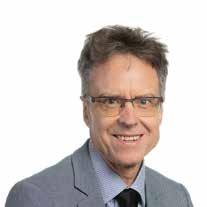

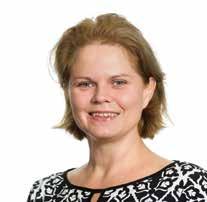
Professor Janine Wichmann is an associate professor at the School of Health Systems and Public Health, Faculty of Health Sciences. She gained research and teaching experience in Europe from 2002 to 2012. Prof Wichmann has been a visiting researcher at the University of Gothenburg, Sweden, since 2013.
Prof Wichmann’s long-term research objective is to estimate the burden of non-communicable disease due to air pollution and climate change indicators while training postgraduate students in these skills. Her research addresses the evidence gaps in air quality management plans as required by the National Environmental Management Act: Air Quality Act (2005) in South Africa.
In 2016, she received a prestigious Fulbright Research Visiting Scholarship. Since 2017, Prof Wichmann has been the local principal investigator for short-term epidemiology studies of the Multi-Angle Imager for Aerosols (MAIA) project of the National Aeronautics and Space Administration (NASA). This is the first time NASA has entered into a partnership with epidemiologists and health organisations using space-based data to study human health and improve lives.
Prof Wichmann received a C2 rating from the NRF.

Dr Marten Wortel is a lecturer in the Department of Mathematics and Applied Mathematics, Faculty of Natural and Agricultural Sciences.
He is a researcher in pure mathematics and specialises in functional analysis, focusing on the theory of partially ordered vector spaces. Within this research area, Dr Wortel is particularly interested in vector lattices and the order structure of operator algebras. In 2019, he was a member of the organising committee of the tenth instalment of the Positivity Conference at the University of Pretoria. This bi-annual conference is the leading conference in the field of partially ordered vector spaces, attracting the top researchers in the field. The conference was a resounding success, and afterwards the organising committee decided to publish conference proceedings under the editorship of, among others, Dr Wortel.
Dr Wortel received a C1 rating from the NRF.



Dr Janneke Aylward is a research fellow at the Forestry and Agricultural Biotechnology Institute and associated with the Department of Biochemistry, Microbiology and Genetics at the University of Pretoria. Additionally, she is affiliated with the Department of Conservation Ecology and Entomology at Stellenbosch University, facilitating close collaboration between the two institutions.
Dr Aylward’s interest lies in the field of genomics and bioinformatics, techniques that she uses to study the biology and ecology of plant-associated fungi. She focuses mainly on species that are of economic significance. Her current work considers the reproduction, population genetics and disease mechanisms of a genus of fungal pathogens that causes leaf and stem diseases of forestry trees.
Since 2018, Dr Aylward has served as an associate editor of the journal of Australasian Plant Pathology, and she is a member of several scientific organisations, including the South African Society for Plant Pathology and the Mycological Society of America. She has presented her research at numerous scientific meetings in South Africa, Australia, Canada and the United States. In 2019, Dr Aylward was a guest speaker at the Pathogen Bioinformatics Workshop in Melbourne, Australia.
Dr Aylward received a Y1 rating from the NRF.
Dr Divan Burger is a senior lecturer in the Department of Statistics, Faculty of Natural and Agricultural Sciences, and serves as a consultant for the external statistical consultation services.
He obtained BCom (Actuarial Science), BCom (Hons) (Mathematical Statistics), and MCom (Mathematical Statistics) degrees at the University of the Free State (UFS) in 2007, 2008, and 2010. He completed his PhD studies supervised by Professors Robert Schall and Abrie van der Merwe at the UFS (2013–2014).
Dr Burger has nine years of experience in biostatistics within the pharmaceutical industry, managing and working in different phases (I–IV) of various research projects. His primary research area is Bayesian nonlinear mixed-effects regression modelling by applying longitudinal data in tuberculosis (TB) research. The nonlinear mixed models he designed for TB data are instrumental in making sound inferences about the early bactericidal activity of TB treatments that are internationally recognised by clinicians who specialise in the development of anti-TB medicine.
The South African Statistical Association (SASA) has awarded Dr Burger the Herbert Sichel Medal in 2020. SASA awards this medal annually to a member who has published the best statistical paper in a scientific journal during the previous year.
Dr Burger received a Y1 rating from the NRF.
Dr Talita Calitz is a senior lecturer at the Department of Education Management and Policy Studies at the University of Pretoria. She completed her doctoral research and a postdoctoral research fellowship under the South African Research Chairs Initiative in Higher Education and Human Development at the University of the Free State. She is involved in several funded research projects related to equality, human development and social justice in higher education. During her postdoctoral fellowship, she was awarded the CICOPS (Committee for Internaional Cooperation and Development) scholarship for collaborative research at the University of Pavia, Italy, in 2017. Her doctoral research focused on the experiences of socio-economically vulnerable undergraduate students in South Africa, which won the SAERA (South African Education Research Association) doctoral dissertation award.
In 2014, she was awarded a Siyaphumelela Scholarship (funded by the Kresge Foundation) for her participatory research. Her current research project is the implementation of a faculty-based student engagement strategy for vulnerable undergraduate students. Dr Calitz’s monograph was published in 2019. Enhancing the Freedom to Flourish in Higher Education brings critical social theory to the problem of unequal participation to challenge the invisible and implicit forms of inequality found within higher education student narratives in the global South.
Dr Calitz received a Y2 rating from the NRF.


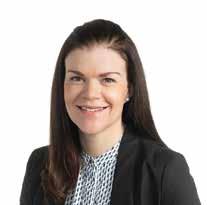
Dr Talita Calitz


Dr Celeste Combrinck is a lecturer in assessment and research methodology in the Department of Mathematics, Science and Technology Education, Faculty of Education. Dr Combrinck supervises postgraduate students in assessment and quality assurance and teaches research methodology to fourth-year students. She presents quantitative data analysis support sessions for postgraduate students and measurement courses for colleagues.
Dr Combrinck is a student of Rasch Measurement Theory and applies modern psychometric models to instrument development and refinement in the social sciences. She received the Tim Dunne Award from the University of Western Australia in 2017 and was the first recipient of the WERA Diversity in Education visiting researcher award in 2019. Dr Combrinck’s publications focus on large-scale assessment data and promoting Rasch applications for educational and social measurement. She is an active member of the Centre for Evaluation and Assessment. During 2016 and 2017, she was the acting director at the centre, and in 2016 the project manager for the Progress in International Reading Literacy Study. Dr Combrinck has been an editorial member of the international journal, Educational Research and Evaluation, since January 2020. She is a member of the Psychological Society of South Africa and collaborates internationally and locally with engineering educators to study the phenomenon of student success.
Dr Combrinck received a Y2 rating from the NRF.

Professor Herbert Kanengoni is an associate professor and programme manager for the professional master’s in industrial psychology in the Department of Human Resource Management, Faculty of Economic and Management Sciences (EMS). His research interests are broadly premised on positive organisational behaviour and how organisations can best retain employees in changing working environments and complexities. He mainly focuses on effective ways of dealing with how employees use their psychological resources to persevere in stressful work environments, including quality of work-life, resilience, and psychological wellness, and the changing psychological contract (what employees expect from their organisations). He is also interested in the protean career (the idea that employees guide their own careers and not by organisations).
His career highlights include positions at various universities in South Africa and the Vrije University, Amsterdam, as a visiting researcher. More recently, he has been involved in the Department of Human Resource Management as an advisory board member and on the postgraduate committee and is also a board member on the EMS Faculty Senior Selections Committee. He currently serves as section editor for the South African Journal of Human Resources Management and is registered with Health Professions Council of South Africa and Allied Health Practitioners Council of Zimbabwe as an industrial psychologist and South African Board for People Practices as a chartered human resources professional.
Prof Kanengoni received a Y2 rating from the NRF.

Dr Joanne Karzis is a control technical assistant in the Department of Production Animal Studies, Faculty of Veterinary Sciences, Onderstepoort. Dr Karzis works as a researcher and is the quality manager of the milk laboratory in this department.
After obtaining her MSc degree (cum laude) in 2005, she continued to conduct research for 16 years in the following areas: udder health, pro-active approach, mastitis, microbiology, antibiotic resistance, and One Health milk laboratory. She has published 23 papers in peer-reviewed journals that include congress proceedings and semi-scientific articles and posters and presentations at national and international congresses, i.e. the International Dairy Federation Mastitis Conference. In addition to these, three papers are pending publication, one of which will be published in the Journal of Dairy Science. She is one of only two experts at the Faculty of Veterinary Sciences whose research focuses on udder health.
She obtained her PhD degree in April 2020 and has been a registered professional scientist with South African Council for Natural Scientific Professions since 2017. She has also discovered a new strain of S. aureus ST 2992, with an abnormal stop codon that has been deposited in Genbank (accession number, MN531305).
Dr Karzis received a Y2 rating from the NRF.



Dr Derik le Roux is a senior lecturer in the Department of Electrical, Electronic and Computer Engineering in the Faculty of Engineering, Built Environment, and Information Technology.
He received his BEng, MEng and PhD degrees from the University of Pretoria in 2009, 2013, and 2017 respectively. He completed his thesis Grinding mill circuit control from a plant-wide control perspective under Prof Ian Craig, who supervised his PhD. The main focus of his research is to resolve significant impediments to the implementation of advanced process control as it relates to the processing industry. He specifically focuses on realistic approaches to system analysis and synthesis for complex systems, the design of accurate control-relevant process models for model-based control and observer design, and advanced control strategies that can be implemented with relative ease. He has served as the treasurer of the South African Council for Automation and Control since 2015, as a member of the Publication Board of the International Federation of Automatic Control (IFAC) since 2017, a member of the Technical Committee for Mining, Mineral and Metal Processing within IFAC since 2018, and as a member of the Early Career Advisory Board for Control Engineering Practice since 2021.
Dr Le Roux received a Y1 rating from the NRF.
Dr Eugene Makgopa (22 Feb. 1985 - 9 Sept. 2020) was a senior lecturer in the Department of Plant and Soil Sciences. He obtained his BSc in Human Genetics in 2005, and his honours in Genetics in 2006, both from the University of Pretoria. He obtained his MSc in Industrial and Commercial Biotechnology from the University of Newcastle, UK, in 2009, followed by his PhD from UP in 2014. During his PhD he was a member of Prof Christine Foyer’s study group at Leeds University (UK). After a ten-month postdoctorate at the Agricultural Research Council he joined the staff of the department as a lecturer in June 2014, being promoted to senior lecturer in 2017.
His particular research interests lay in plant biotechnology, especially in cysteine protease inhibitors and the role they play in helping the plant (notably soybean) respond to biotic and abiotic stress. He was a research leader within the molecular plant physiology research group in the Forestry and Agricultural Biotechnology Institute, and recently joined the grain research programme. At the time of his passing he was expanding his research group and his collaborations, and had supervised five postgraduate students. He was a rising star at UP and in South African academia, and was, for example, nominated for election as a council member of the South African Association of Botanists.
Dr Makgopa posthumously received a Y2 rating from the NRF.
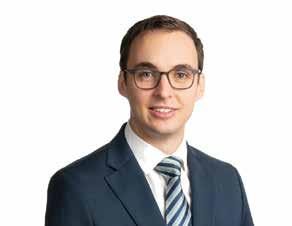

Dr Kgadi Mathabathe is the Deputy Director: Academic Development in the Department for Education Innovation. Her research primarily focuses on science education, specifically chemistry education. She conducts and supervises research focusing on innovative chemistry teaching and learning strategies that promote self and socially regulated learning and the development of student and educator metacognition.
She has successfully supervised postgraduate research focusing on collaborative learning and inquiry-based science education. Dr Mathabathe has published in national and international high impact factor journals in her field since 2014. She has over ten years of experience teaching chemistry and training pre- and in-service science educators in higher education.
She has served as an external examiner to theses and dissertations at more than five South African universities. The titles examined ranged from innovative science teaching strategies to science teacher pedagogical content knowledge. She is a reviewer for several science education journals such as the African Journal of Research in Mathematics, Science and Technology Education. Her most important recognitions to date are receiving the South African Chemical Institute Chemical Education Award and the University of Pretoria Teaching Excellence and Innovation Award. She has also been listed as one of the Mail & Guardian’s top 200 young South Africans in the education category.
Dr Mathabathe received a Y2 rating from the NRF.

Dr Kgadi Mathabathe


Dr Mbuso Mlambo is a chief researcher in the Department of Physics, Faculty of Natural and Agricultural Sciences.
His research interests involve synthesising nanomaterials and their application in surface-enhanced Raman spectroscopy, manufacturing of nuclear ceramic materials, and Raman analysis of their response to irradiation. He has contributed to more than 34 articles and five conference proceedings. He has successfully supervised eight master’s and one doctoral student. He received post-doctoral NRF Thuthuka funding from 2017 to 2020.
Dr Mlambo received a Y2 rating from the NRF.

Dr Nedine Moonsamy is a senior lecturer in the Department of English at the University of Pretoria. She is currently writing a monograph on contemporary South African fiction and otherwise researches science fiction in Africa. In 2016 she was both a nominee in the Mail & Guardian’s 200 Young South Africans and received a Certificate of Excellence from the provincial government. To date, she has held two international research fellowships, one at the Institute for African and Asian Studies, Humboldt University, Berlin (2017) and, more recently, the Newton Researcher Links Grant, in the Visual Cultures Department at Goldsmiths College, University of London (2019).
She is currently a member of the Intra-Africa Mellon Focus Area research project on Urban Cultures and Popular Imaginaries in Africa, which runs from 2017 to 2021 and is based at Rhodes University. She serves on the editorial board of Imbizo: International Journal of Literary and Comparative Studies. Her debut novel, The Unfamous Five (Modjaji Books, 2019), was shortlisted for the National Institute for the Humanities and Social Sciences Fiction Award, and her poetry was shortlisted for the inaugural New Contrast Award in 2021.
Dr Moonsamy received a Y1 rating from the NRF.

Dr Suzanne Smith is a senior lecturer in the Department of Electrical, Electronic and Computer Engineering, Faculty of Engineering, Built Environment and Information Technology at the University of Pretoria.
Her research focus has primarily been on developing point-of-care health and environmental diagnostic solutions, with emphasis on resource-limited settings. Dr Smith’s primary research interests include printed functionality to realise integrated, augmented and low-cost devices for point-of-care testing, including microfluidics, printed electronics, scalability and packaging aspects. These efforts culminated in her receiving her doctorate of engineering magna cum laude from the Karlsruhe Institute of Technology, Germany, in 2019. Dr Smith was a guest speaker at the Institute of Electrical and Electonics Engineers (IEEE) Nano 2020 conference, with a current h-index of 10 and 19 journal papers, 29 conference papers and two book chapters. In the past year, she has secured research funding to develop her research further and improve teaching and learning by developing online practicals for electronic engineering students. She has established several international collaborations, became a senior member of the IEEE, and obtained her registration as a professional engineer with the Engineering Council of South Africa. Dr Smith enjoys teaching foundational electronic engineering modules and sharing her passion for emerging novel and multidisciplinary engineering technologies.
Dr Smith received a Y2 rating from the NRF.



Dr Thabsile Thabethe is a lecturer in the Department of Physics, Faculty of Natural and Agricultural Science. She teaches physics to liological science/life science in the extended program and participates in the second Department of Higher Education and Training Future Professors Programme.
Dr Thabethe obtained a PhD in Physics in 2018 from the University of Pretoria in the nuclear material group. Her research focus is on material science/solid-state physics, and includes nuclear material, ion beam analysis, thin-film ion irradiation, metal-ceramic composites and biomaterials.
Dr Thabethe collaborates with the South African Nuclear Energy Corporation and the Joint Institute for Nuclear Research in Russia. Her research was awarded funding from the University of Pretoria Research Development Programme (2020) and multiple NRF grants (2014, 2017, and 2018). While completing her PhD (2016), she won the best poster presentation award in the Ion Surface Interactions Conference, which was held in Moscow. She has reviewed scientific research articles for a conference and research journals such as RSC Advances and the Applied Physics Journal since 2017.
Dr Thabethe received a Y2 rating from the NRF.
Dr Philemon Tsele is a senior lecturer at the University of Pretoria in the Department of Geography, Geoinformatics, and Meteorology. Dr Tsele received his PhD degree in geoinformatics from the University of Pretoria, in 2019.
He was a research fellow with the remote sensing research unit of the Meraka Institute, Council for Scientific and Industrial Research from 2009 to 2014, and subsequently with the South African Radio Astronomy Observatory, in Hartbeesthoek, from 2014 to 2018. He presents courses in physical principles of remote sensing, digital image processing, and advanced remote sensing. Furthermore, his research interests include thermal modelling of site-based optical telescopes, modelling vegetation biophysical and biochemical variables in natural environments, and validating remotely-sensed satellite products.
Dr Tsele received a Y2 rating from the NRF.
Dr Liezl-Marié van der Westhuizen is a senior lecturer in the Department of Marketing Management, Faculty of Economic and Management Sciences. Her research focuses on consumer relationships with brands, products and services. She is a member of the Association for Consumer Research and the Southern African Institute for Management Sciences.
She received an Emerald Literati Award (Commended Paper, 2019) for her article in the respected Journal of Product and Brand Management, investigating brand experience as verification of consumers’ self-brand connections. Furthermore, she was a visiting Iso Lomso Fellow at the Stellenbosch Institute for Advanced Studies (STIAS), also in 2019. As part of an international research team with Professor Kelly D Martin (Colorado State University) and Professor Robin A Coulter (University of Connecticut), she received a Transformative Consumer Research grant in 2018 and a Best Paper Award in the Track at the 2019 Winter American Marketing Association Conference.
Upon receiving the Stephan and Pierre Viljoen Award in 2015, she hosted an international United States scholar, Professor Julie Ruth, to share her experience with a broader stakeholder group at the University of Pretoria. This has resulted in an annual student interaction opportunity with Rutgers University (United States of America). She has also been a research project leader for South African National Parks in 2019.
Dr Van der Westhuizen received a Y2 rating from the NRF.
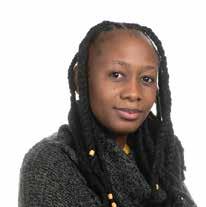




Dr Jacomien van Niekerk is a senior lecturer in the Department of Afrikaans, Faculty of Humanities, where she teaches literature at undergraduate and postgraduate level.
Her doctoral research focused explicitly on the nonfiction trilogy of the well-known South African writer Antjie Krog. She investigated themes such as nationhood, belonging, race, restitution, and Ubuntu in these works. She then published a monograph based on her doctoral thesis, titled ‘baie worde’: Identiteit en transformasie by Antjie Krog (Many becomings: Identity, transformation and Antjie Krog). She has published articles in various South African journals on Afrikaans poetry, plays and films; oral literature in Africa; critical race theory; and postcolonial theory.
Since 2015, Dr Van Niekerk has served on the editorial board of Tydskrif vir Letterkunde (Journal for Literature): a journal for African literature. In 2020 she became the editor of the journal and member of the Tydskrif vir Letterkunde Association executive committee. She is the treasurer of the International Society for the Oral Literatures of Africa. The English Academy of Southern Africa awarded her the Thomas Pringle Award for scholarly articles for 2018.
Dr Van Niekerk received a Y2 rating from the NRF.

Dr Neriman Yilmaz is a senior postdoctoral fellow in the Forestry and Agricultural Biotechnology Institute and in the Department of Biochemistry, Genetics and Microbiology.
Her research interest is fungal biodiversity with a special focus on systematics and taxonomy. Her current focus is the systematics and taxonomy of Fusarium, an agriculturally important mycotoxigenic genus. Identification of food and feed spoilage fungi, applying both traditional and molecular monitoring methods, is crucial in maintaining food safety and quality of food and feed products from farm to fork. She recently received a Marie Skłodowska-Curie Research and Innovation Staff Exchange grant entitled ‘Mycobiomics’, which aims to exploit the mycobiota of Asia, Africa and Europe for beneficial metabolites and potential biocontrol agents, using -OMICS techniques. She has published more than 30 peer-reviewed articles, on novel species descriptions in the genera such as Fusarium, Talaromyces and Aspergillus, and they have been cited more than 2200 times, and has an h-index of 21.
In addition to research, she has a passion for generating public awareness of the importance of fungi. She leads a citizen science project in collaboration with Westerdijk Fungal Biodiversity Institute (the Netherlands) to increase the awareness of mycology and science among young South Africans.
Dr Yilmaz received a Y2 rating from the NRF.

The evaluation and rating of individuals is based primarily on the quality of the research outputs and is undertaken by national and international peers/reviewers.

University of Pretoria
Private Bag X20, Hatfield 0028, South Africa
Tel +27 (0)12 420 4111, Fax +27 (0)12 420 4555, www.up.ac.za